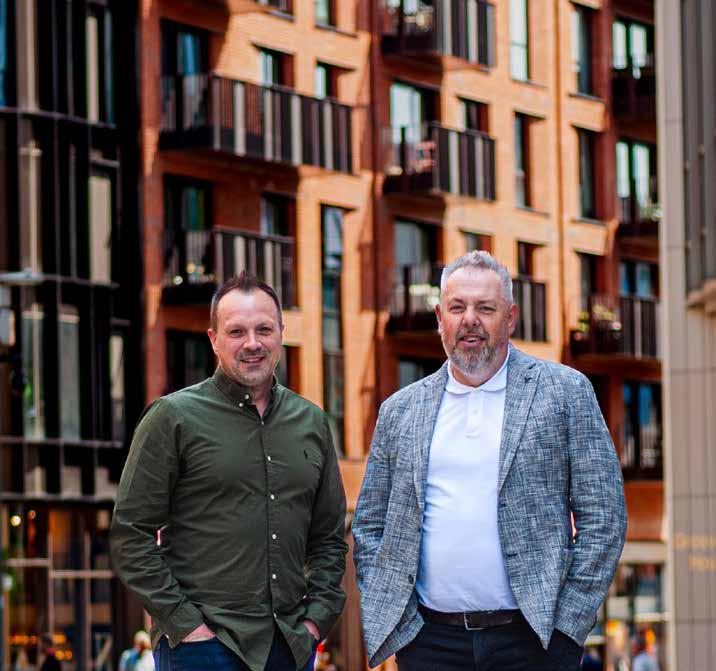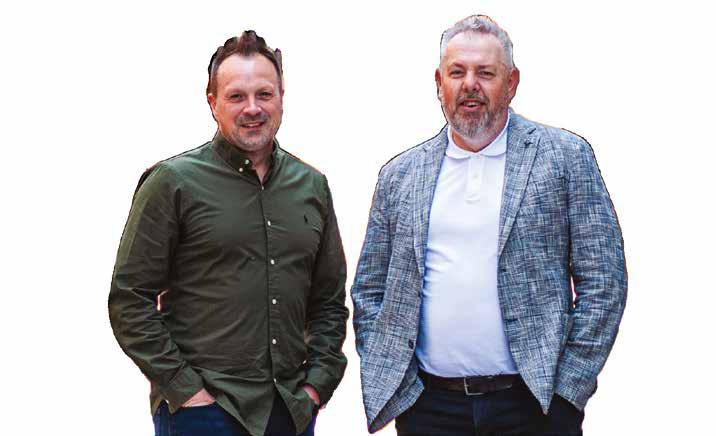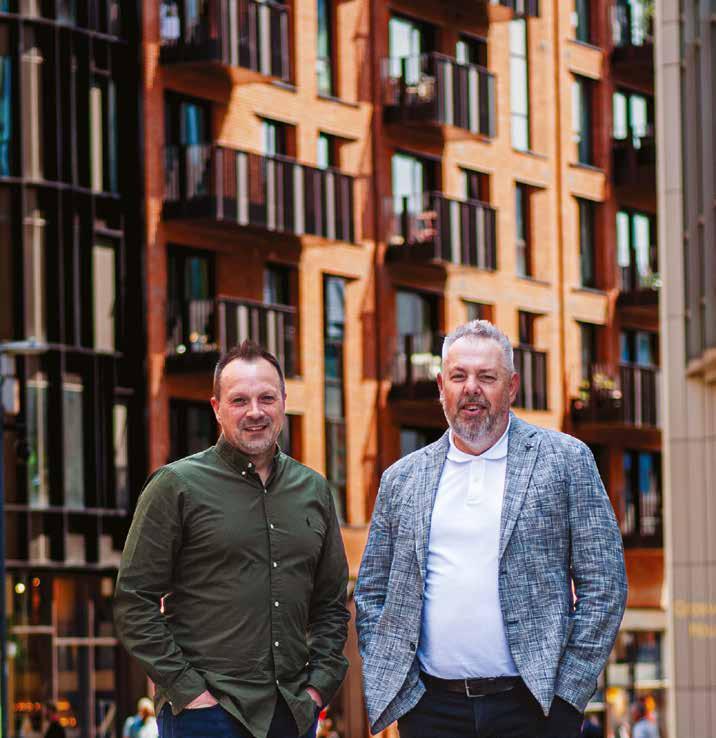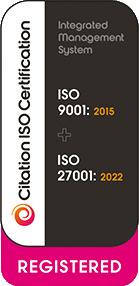PLUS… NEWS, INTERVIEWS, EXPERT ADVICE AND MORE!


PLUS… NEWS, INTERVIEWS, EXPERT ADVICE AND MORE!

HOW VIVID CREATIVE HAS KEPT BRANDS BURNING BRIGHT FOR OVER 25 YEARS AWARDS SEASON EVERYTHING YOU NEED TO KNOW ABOUT THIS YEAR’S UNLTD BUSINESS AWARDS – AND HOW TO GET YOUR NAME ON THE SHORTLIST
STITCHING IT ALL TOGETHER BUFFALO SYSTEMS BEGINS A NEW CHAPTER WITH FRESH VISION AND SUPPORT
THE BIG DAY OUT HIGHLIGHTS AND KEY TAKEAWAYS FROM OUR EXPO SHOWCASE OF SOUTH YORKSHIRE ENTERPRISE
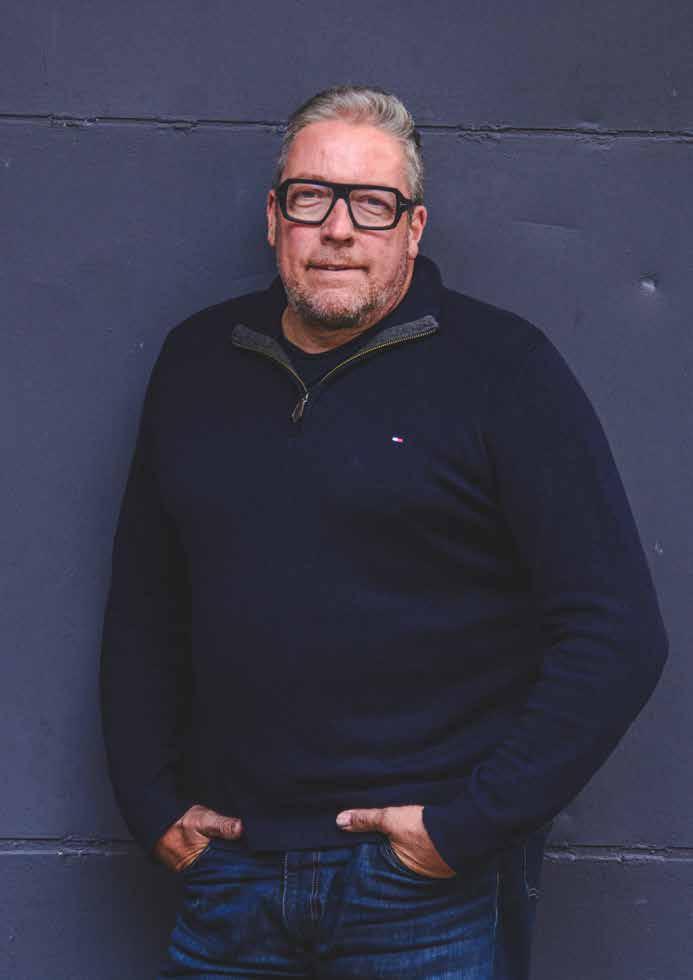



CASINO . RESTAURANT . BAR





3 COURSES DRINK * £5 BET *





NEW LOOK NAPOLEONS COMING IN NOVEMBER!CASINO OPEN AS NORMAL DURING REFURBISHMENT








BRADFORD | HULL | LEEDS | MANCHESTER | SHEFFIELD














TUESDAY 23RD & 30TH















THE COVER...
32: ON BRAND
From spray mount pitches to navigating smart data, Vivid Creative is still lighting up Sheffield’s creative scene. Founder Gerry Acari takes unLTD through the agency’s evolution, ethos and what keeps brands shining after 26 years.
22: THE CHALLENGE ADDICT
From Westminster corridors to international boardrooms, Ashley Harris has built telecoms success story Jibba Jabba on a love of problemsolving. In the latest ‘Inside Track’ interview, Russ Thompson learns how challenge – not comfort – drives Ash and his business forward.
30: THREADING THE FUTURE
We discover how adventurer Ben Fogle and Savile Row tailor James Sleater are breathing new life into heritage brand Buffalo Systems – with Business Sheffield helping the heritage brand stitch things together.
42: BOLD BY DESIGN
For our latest spotlight on a local entrepreneur, Barnsley’s Chloe Wilkin shares how she turned frustration into freedom – leaving corporate life behind to launch Wilkin Design, a studio built on bold ideas, clear thinking and a love of brand storytelling.
48: FULL OF BEANS
After fast growth and hard lessons learned, Nam Sông’s Jim Rose tells unLTD about refocusing his business on the original plan of action: bringing Vietnamese coffee to the masses.

Hello and welcome to the latest issue of unLTD!
October’s been a bit of a whirlwind here at HQ –deadlines flying, coffee flowing and one very busy calendar. We kicked off the month with our Business Expo at Magna. I didn’t make it (the publishing gods demanded I stay chained to my desk), but Ash, Phil and Nick were there flying the flag and had a great time. The feedback’s been brilliant, and I’ve been catching up by listening to a few of the podcast interviews – including one with Ashley Harris from Jibba Jibba, which you’ll find covered in this issue, along with a round-up of key takeaways from the day.
It’s also been a lively one when it comes to new openings and business arrivals. We went along to the press night for Abbeydale Ballroom – the True North team have done a stunning job transforming the old Picture House Social – before popping into our new local, the Merchant’s House in Kelham Island (purely for research purposes, of course). Down at the quays, there’s a shiny new spot called Tavern on the Quays, and the Sandman Signature hotel has taken over the old Best Western site – a real glow-up for the waterfront.
In the heart of the city, Leah’s Yard continues to thrive with new independent retailers joining the mix, and more units being snapped up in the surrounding area. Perhaps most excitingly, the soon-to-open Güs wellness spa will be taking over the Bethel Building on Cambridge Street – another sign that this corner of town is really coming together.
Alongside exploring and writing about new venues, we’ve been catching up with some of the region’s most inspiring entrepreneurs. For this month’s cover interview, I sat down with Gerry Acari, founder of Vivid Creative, to chat about 26 years in the industry – from frantic storyboard pitches and the early days of business websites to today’s fastmoving world of AI and digital noise.
Elsewhere, we’ve got the inside story on Buffalo Systems’ much-talked-about takeover by Ben Fogle and his team, news of big law firm mergers and plenty of stories about starting, growing and thriving in business – all packed in for your reading pleasure.
P.S. If you haven’t entered our unLTD Business Awards yet, now’s the time – the deadline’s at the end of the month. It’s always a cracking night celebrating the brilliant people and businesses that make our region so special.
Catch you next month!
Joe
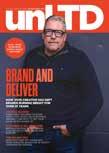
EDITORIAL
EDITOR
Joe Food
Joe@unltdbusiness.com
ONLINE EDITOR
Ash Birch
Ash@unltdbusiness.com
COLUMN EDITOR
Isobel O'Mahony
VIDEO CONTENT CREATOR
Lizzy Capps
lizzy@unltdbusiness.com
DESIGN
Marc Barker
ADVERTISING
Phil Turner
phil@unltdbusiness.com
07979 498 034
Nick Hallam
nick@exposedmagazine.co.uk 07843 483536
FINANCE
Lis Ellis
accounts@ exposedmagazine.co.uk
CONTRIBUTORS
Dan Bumby
Steve Brown
Wendy Ward
Jill White
Ruby Deakin
unLTD is published monthly by Blind Mice Media Ltd Unit 1B Rialto, 2 Kelham Island Sq., Kelham Riverside, Sheffield S3 8SD
The views contained herein are not necessarily those of Blind Mice Media Ltd and while every effort is made to ensure information throughout unLTD is correct, changes prior to distribution may take place which can affect the accuracy of copy, therefore Blind Mice Media Ltd cannot take responsibility for contributors’ views or specific listings.






Entries open NOW – get involved! The unLTD Business Awards are back for 2025 – and we’re ready to celebrate the brilliant people and organisations powering our region forward.
Entries are now officially open – and we’ve made it as simple as possible to take part!
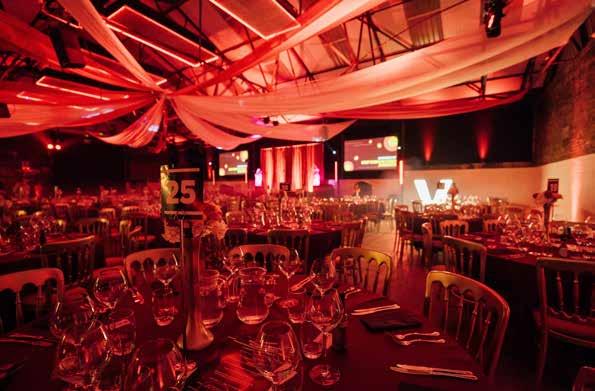
There’s a four-week window to get your entry in. All we need are a few company details, then either: – a written entry of up to 1,000 words – or a short video of no more than 5 minutes
You can enter as many categories as you like – and most entries can be easily adapted across multiple awards. We know you’re busy, so we’ve stripped back the red tape. It’s quick, clear and designed to let your work do the talking. Deadline is Tuesday 28 October, so be quick!
SHORTLIST ANNOUNCED – 5 NOVEMBER
This is the nail-biting bit. Once our judges have read, watched and debated your entries, we’ll reveal the shortlist on Tuesday 5 November.
You’ll have plenty of time to plan your outfit – and your acceptance speech – before the big night. Tickets go on sale the same day and can be booked via our website or by emailing phil@unltdbusiness.com
AWARDS CEREMONY – 11 DECEMBER
We’ll be celebrating the best in business on Wednesday 11 December at Peddler Warehouse in Sheffield’s Kelham Island district.
Doors open at 6.45pm, with the event running until 11pm – followed by an after party at Factory Floor just around the corner. Expect top-tier food and drink, plenty of laughs and a fantastic night to round off the year in style.
A major new strategy to help more people in Sheffield find secure jobs, gain new skills and build better futures has been launched by Sheffield City Council and its partners. SHEFFIELD’S

The Employment and Skills Strategic Plan outlines a city-wide commitment to breaking down barriers to work, supporting inclusive economic growth, and equipping people for a changing world of work. Developed in collaboration with employers, education providers, voluntary organisations and communities, the plan aims to ensure that everyone in Sheffield – regardless of background – can benefit from the city’s growth.
While Sheffield’s economy is growing, and its population is becoming more skilled, challenges remain. The city continues to face high levels of economic inactivity, with many residents unable to access employment due to health, caring responsibilities, or other structural barriers.
Councillor Mohammed Mahroof, Chair of the Economic Development, Skills and Culture Committee at Sheffield City Council, said:
“This plan is about investing
in Sheffield’s greatest asset –its people.
“By working together across sectors, we can unlock talent, break down barriers and ensure everyone has the chance to succeed. On a practical level, that means better careers advice, more apprenticeships, and targeted support for people who’ve been out of work.
“It also prepares Sheffield for the future – through green jobs, digital skills, and support in the communities that need it most.”
Putting people at the centre of Sheffield’s future
The strategy is built around three core missions:
• Driving good economic growth by supporting local businesses to create quality jobs, helping people to upskill and linking local talent to local opportunities.
• Tackling inequality by addressing barriers to employment and supporting those facing disadvantage, with a focus on inclusive
workplaces and fair pay.
• Preparing for a sustainable future by equipping residents and employers with the skills needed for the green economy, digital industries and emerging technologies.
Key elements include improving access to careers guidance, clearer training routes, and tailored support for young people and those facing long-term unemployment. Businesses will be supported to recruit, train and retain staff, while also being encouraged to lead by example as good employers.
The strategy also places a strong emphasis on future skills – particularly in fast-growing sectors like clean energy, tech, and advanced manufacturing –to ensure Sheffield remains economically resilient in the years ahead.
What happens next? Delivery of the plan will be led by partners including Sheffield
City Council, Sheffield Chamber of Commerce, and The Sheffield College, with regular updates to track progress towards 2030 goals. The strategy will be reviewed annually to adapt to changing conditions.
Sheffield Hallam University
• Sheffield City Council • AMRC cluster • SME base
Sources: ons.gov.uk // sheffield.gov.uk
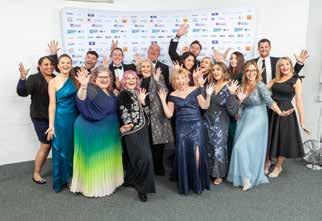
Sheffield Chamber of Commerce and Industry (SCCI) has been shortlisted for the prestigious Chamber of the Year title at the British Chambers of Commerce (BCC) Awards 2025.
The recognition places Sheffield firmly in the national spotlight, with the shortlist celebrating chambers across the UK that demonstrate innovation, impact and outstanding support for their business communities.
SCCI’s nomination highlights the work of its international trade arm – the Sheffield International Trade Centre (SITC) –which has seen significant growth and national recognition over the past year. SITC is the only chamber-run trade centre in the world with Authorised Economic Operator (AEO) status, and now delivers compliance-ready international trade services on behalf of 10 other chambers across the UK.
It is also one of only a few chambers to offer consultancy (including CBAM advice), ChamberCustoms, a HUB service and Arab-British documentation – a breadth of services that has positioned it as a key player in the UK’s international trade landscape.
Nick Patrick, Director of International Trade at SCCI, said:
“We’re thrilled to receive this shortlisting which recognises the hard work and passion of the international trade centre, as well as Sheffield Chamber more generally.
“My long-term objective has been to make us one of the leading international trade service providers, Customs Brokers and compliance consultants in the UK – and a shortlisting like this is a massive milestone towards achieving that goal.”
SITC currently supports around 1,000 businesses across the UK and internationally, guiding firms through export processes and helping them develop tailored strategies for international growth.
Its contribution to the region is also deeply strategic –supporting local business resilience and playing a key role in shaping economic growth plans led by the South Yorkshire Mayoral Combined Authority.
The last financial year saw SITC’s declaration sales grow by 42 per cent, with consultancy services increasing by 500 per cent and documentation sales up 12 per cent – figures that reflect the centre’s operational strength and trusted business relationships. Winners of the BCC Chamber Awards will be announced on 15 October.
FASHION RETAILER JOINS HEART OF THE CITY DEVELOPMENT
Alternative fashion brand Damaged Society is opening a new store in Sheffield’s Heart of the City, at the corner of Pinstone Street and Charles Street. Known for its mix of cult labels, pop-culture merch and edgy style, the retailer’s stock will feature homages to local artists like Bring Me The Horizon. The store nods to Sheffield’s creative energy, which Mark Eley of Damaged Society called a perfect fit. Councillor Ben Miskell said the opening was “fantastic” for the city.
ICONIC SHEFFIELD HOTEL REBRANDS AFTER MAJOR TRANSFORMATION
Sandman Signature Sheffield Quays Hotel has officially launched following an 18-month transformation of the former Best Western Plus site at Victoria Quays. Canadian group Northland Properties acquired the hotel in 2022 and began extensive renovations, including all 128 bedrooms, new event spaces, and the addition of bar and restaurant Tavern on the Quays, located beneath restored Grade II listed arches.
SHEFFIELD TEAM WINS FIRST NATIONAL AI IMPACT AWARD
University of Sheffield researchers have won the UK’s first national AI research impact award for their work on responsible AI. Recognised at the inaugural UK AI Research Symposium, the team, led by Dr Denis Newman-Griffis and Dr Susan Oman, collaborated with the British Library, Sheffield City Council and others. Their findings are shaping inclusive AI policy across the UK and were cited in a recent Public Accounts Committee report, cementing Sheffield’s role in ethical AI development.
HALLAM GRADUATE NAMED UK’S MOST INFLUENTIAL WOMAN IN CONSTRUCTION
Sheffield Hallam graduate Katy Robinson has been named the UK’s Most Influential Woman in Construction at the national 100 Most Influential Women in Construction Awards. Katy, now a senior project manager at East Riding of Yorkshire Council, was recognised for her leading role in a nationwide campaign for more inclusive PPE. The awards celebrate women driving positive change in the built environment sector. Katy also won the Local Hero – North East award at the ceremony in Birmingham.
A new wellness destination offering sauna and ice bath experiences, alongside a Scandinavian-style café, is set to open in Sheffield city centre this winter.
Güs, an independent wellness brand, will launch its first location in the historic Sunday School building at 34 Cambridge Street – part of Sheffield City Council’s Heart of the City development. The space will offer both unguided and guided sauna and ice bath sessions, alongside a community-focused café that champions local suppliers.
Designed to bring a fresh approach to wellbeing in the city, Güs combines traditional Nordic rituals with contemporary design. The venue aims to provide a calming retreat for city workers, residents and visitors looking to relax and unwind.
Cllr Ben Miskell, Chair of the Transport, Regeneration and Climate Policy Committee at Sheffield City Council, welcomed the news, saying: “From the
outset, our ambition for Heart of the City was to deliver something different – something high-quality that would draw people back into the city centre. Welcoming Güs shows we are achieving just that.
“This will be the first facility the company has opened, which is a strong vote of confidence not only in our development but also in Sheffield’s wider city centre. It also underlines our commitment to restoring and repurposing heritage buildings wherever possible.”
A spokesperson for üs added: “We’ve found the perfect home in the Sunday School building – a beautiful blend of old character and new design. This isn’t just about offering a new service; it’s about creating a true community space.”
Fit-out works are already underway, with the opening planned for winter 2025. For updates and behind-thescenes previews, follow @gus.wellness on Instagram.
Sheffield’s Lunar Chinese New Year Festival officially launched its 2026 edition with a special event at the Radisson Blu, bringing together civi c leaders, artists, business partners and community representatives, including the Lord Mayor of Sheffield, Safiya Saeed.
The event introduced the 2026 programme, which promises a week-long series of vibrant events across the city, offering exciting opportunities for schools, businesses, and residents to get involved as Sheffield prepares to welcome the Year of the Horse. Festivities will culminate in a free weekend celebration in the Peace Gardens on Saturday 21 and Sunday 22 February.
Festival Founder and Chairman of Cultural Inclusive CIC, Jerry Cheung, said: “This festival started small, but it has grown into something
that belongs to all of Sheffield. It is a celebration of culture, but also of this city’s energy, its people, and its future.
The response in 2025 was incredible. In 2026, we want to go even further. We’re inviting artists, communities, and businesses to join us — the doors are open.”
In 2025, the celebrations raised over £12,000 for The Children’s Hospital Charity, and engaged dozens of schools and community groups through performances and volunteering. One of the most memorable moments was a Mandarin song performance by children from across Sheffield, arranged by Sheffield Music Hub—a powerful symbol of unity and shared cultural learning.
Organised by Cultural Inclusive CIC and supported by Sheffield City Council, the 2026 festival features a mix of free public events,
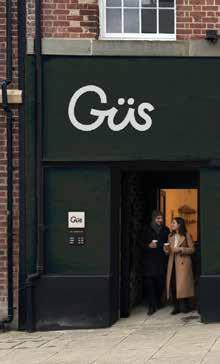
ticketed gala performances, and fundraising activities. This year’s edition is expected to be the most ambitious yet.
The main weekend celebration will once again turn the Peace Gardens into a lively showcase of Chinese culture, featuring lion and dragon dances, martial arts demonstrations, opera, street food, and community performances.
Other confirmed events include the Children’s Hospital Light Switch-On on Monday 16 February, a Spectacular Show at The Octagon on Wednesday 18 February, the Meadowhall Chinese New Year Extravaganza on Friday 20 February, the City Centre Chinese New Year Festival at the Peace Gardens on Saturday 21 and Sunday 22 February, and a Charity Banquet at China Red in aid of Sheffield Children’s Hospital on Wednesday 25 February.
The 2025 celebrations attracted tens of thousands of visitors and generated over £250,000 in additional city centre spending. According to Sheffield BID, around 30% of visitors came from outside of the city.

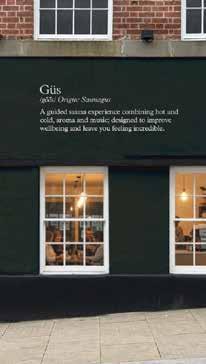

Stripping back the biggest business stories – what happened, who’s involved and why it matters to our region.

What’s the story?
Urban Splash has submitted a full planning and listed building application for the former Cole Brothers building in Sheffield city centre – a significant milestone in the redevelopment of one of the city’s most iconic landmarks.
The Grade II listed building is set to be transformed into a vibrant mixed-use destination, incorporating retail, leisure and workspace, and forming a key part of the ongoing Heart of the City regeneration scheme.
What will it look like?
The plans include:
• Ground and lower levels repurposed for leisure, retail and entertainment
• Upper floors converted into flexible office and workspace
• Restoration and preservation of key architectural features
• Improved public access to areas previously closed off
Designed in collaboration with Sheffield City Council, the scheme aims to breathe new life into the historic site while meeting the needs of a modern city centre community.
Why does it matter?
This development marks a major step forward in regenerating Sheffield’s urban core. As a prominent anchor within the city centre, Cole Brothers is not only a symbol of retailheritage but a site with strong emotional ties for many residents. The project supports ongoing efforts to:
• Drive footfall and local economic activity
• Create inclusive, accessible public space
• Deliver high-quality office and commercial environments
• Sustain momentum for city centre regeneration
Who is involved?
Urban Splash – the Manchester-based developer known for reviving heritage buildings – is leading the scheme, having taken on the Cole Brothers site in 2023. The company has a proven track record in Sheffield, notably at Park Hill, and has since used the Cole Brothers building to collaborate with cultural events such as the Crossed Wires Festival.
Key partners include:
• Sheffield City Council
• Local communities and business stakeholders
• Heritage and planning consultants
Councillor Ben Miskell, Chair of the Transport, Regeneration and Climate Policy Committee, said the proposals offer a longterm future for a “cherished and iconic” building – opening it up for public use in new and meaningful ways.
What happens next?
The public can view the full planning proposals and provide feedback via the Urban Splash website: urbansplash.co.uk. If approved, the redevelopment will hopefully contribute to a more dynamic and economically resilient city centre – ensuring the legacy of Cole Brothers continues for generations to come.


Microsoft will officially end support for Windows 10 on 14th October, 2025. After this date, Microsoft will no longer provide security updates, patches, or technical support for the operating system. For businesses across the UK, this marks a critical deadline that brings both risks and opportunities.
Continuing to use Windows 10 after support ends introduces several significant risks:
• Higher risk of malware, ransomware, and other threats
• Outdated systems can cause compliance breaches, especially with sensitive data
• Greater risk of business disruption and costly downtime
• The longer you wait, the more exposed and harder to recover
Meanwhile, upgading offers a suite of enhancements designed for today’s business environment:
• Stronger security and protection
• Easier device management for IT teams
• Better tools for hybrid/remote work
• Ready for future AI-powered features







A year on from being named the real-ale capital of the world, a new report suggests Sheffield’s independent drinks game is still unmatched. 'Place, Craft and Alcohol in Historical Perspective', from researchers at the University of Sheffield, surveyed more than 460 producers and retailers over a year, building on evidence from the 2024 Sheffield Beer Report. The numbers point to Steel City being one of the best places in the country for a few down the local.
Raising a glass – the stats on sups:
• 42% of Sheffield alcohol outlets are independently owned or operated.
• Sheffield has 4 breweries per 100,000 people, while big cities such as London and Manchester don’t reach 1 per 100,000.
• The city alone brews around 780 beers each year; across the South Yorkshire Mayoral Combined Authority it’s about 1,800.
• Almost 70% of alcohol produced in Sheffield is consumed within the city.
• The average pint of cask ale in Sheffield is £3.63 (CAMRA, 2024), compared with a UK average of £5.90.
The researchers also found local brewers increasingly reject the now-mainstream “craft” label, preferring “independent”. The report recommends a “Sheffield Indie Drinks” body to celebrate the sector’s community and heritage – and to recognise it as a valuable part of the city’s economy. If that means more Sheff brews on draught, count us in.

With Jill White of Andy Hanselman Consulting
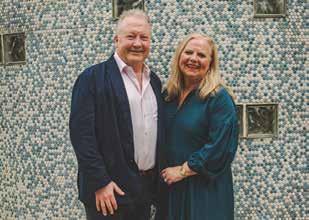
September networking was back with a bang!
The month kicked off with a fond farewell lunch for Carolynn McConnell, who, after doing a wonderful job at Sheffield Business Together, has returned to the DWP – she’ll be greatly missed.
Next came a flurry of fundraising for The Master Cutler’s Charity: Ovo Spaces hosted their summer party and sports day; Vickie Clarke Brown put on a fabulous Style Night with personal stylist Peter Kane at the Cutlers’ Hall; followed by a Night of Magic, also at The Hall; and finally, the muchanticipated Big Reveal Night hosted by the Master Cutler himself.
A whopping £107,010 was raised in total for The Sheffield Hospitals Charity Dementia Appeal – an amazing effort by all involved!
Art in the Gardens was as lovely as ever, and there was even more creativity at the Cars and Art Event at Leah’s Yard, where Amadora Art unveiled her striking painting of Sheffield racing driver Rowan Campbell-Pilling.
Meanwhile, DoubleTree by Hilton celebrated their first year in operation, Sheffield Stadium launched its impressive new co-working space, and also announced plans for the Big Sheffield CEO Sleepout – one to keep an eye out for!
Lions were on display at the Radisson Blu for The Children’s Hospital Pride of Yorkshire launch, and 3D Connect proudly showcased the sleek new home of BHP Accountants.
Sheffield Theatres joined the networking scene too, launching their own group where Adam Battey entertained guests with fascinating behind-the-scenes stories from the Crucible.
All in all, it was a packed month – and that’s before mentioning a whirlwind trip to London for the National Television Awards with Sheffield-based BIDBI, who supplied all the VIP guest bags for the event. (Yes, I managed to snag one too!)
Here’s to an equally exciting October ahead!
Follow Jill at uk.linkedin.com/in/jilltywhite or find Andy Hanselman Consulting at andyhanselman.com.
This autumn’s unLTD Business Expo at Magna was another superb event – a brilliant day packed with conversation, connections and collaboration. Huge thanks to everyone who came along, from exhibitors and speakers to the hundreds of visitors who filled the hall with energy all day long.
Across the day, we hosted a series of free seminars featuring some of South Yorkshire’s most forward-thinking business owners and leaders. From exploring how AI and automation are reshaping the way we work, to honest discussions about growth, culture and purpose, there was plenty for everyone to take away.
HERE’S WHAT WE LEARNED…
“Crystal is a bit stalkery… but scarily accurate”
Ryan Daniels from Sheffield-based digital agency Hydra Creative took to the stage for Beyond ChatGPT – AI and Automation Tools That Actually Boost Sales.
His message was simple: AI isn’t about replacing people, it’s about helping them work smarter. Ryan shared a handful of tools Hydra uses to streamline its sales process – including Crystal, a plug-in that analyses LinkedIn profiles to predict how a person prefers to communicate.
“It’s scarily accurate,” he admitted. “A little stalkery, but it really helps you approach people in the right way.”
The audience also learned that most of these tools – including Fireflies, Factors. ai and Apollo – offer surprisingly powerful free versions. As Ryan put it, “If it saves you a day, you’ve already won.”
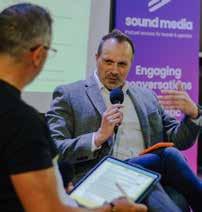
“Anyone will have a coffee in Dubai –even a Sheikh”
Jibba Jabba’s founder Ashley Harris joined Russell Thompson for a live Inside Track podcast – billed as Cutting Through the Noise, he talked about leadership, culture and running a business across two time zones.
He shared his experiences of working between the UK and Dubai, explaining how face-to-face meetings are still at the heart of doing business in the UAE. “Anyone will meet you for a coffee in Dubai,” he said. “Even a Sheikh. Try getting that meeting past a receptionist here!”
Ashley also discussed how cultural differences shape his leadership style. With clients and staff around the world, he’s built a business grounded in empowerment and trust – one where team members are encouraged to take ownership.
Staff empowerment isn’t a buzzword – it’s action
That trust was clear when Ashley described the day his Dubai team surprised him by pitching a full business expansion plan.
“They brought out a business plan with everything mapped out – staffing, roles, even interviews lined up,” he said. “As a leader, your job is to say, let’s go do it.”
It was a standout reminder that the best ideas don’t always come from the top –and that giving people the space to take initiative can create real growth and loyalty.
Staying small can be a power move
In Small is Beautiful… One Year On, a follow-up to last year’s popular episode of the unLTD Business Podcast, consultant Russell Thompson, recruiter Becca Morris and marketer Laura Stead shared the realities of running solo and small businesses.
For Russ, keeping things lean is a conscious decision, not a limitation. “I’ve systemised my business so it runs
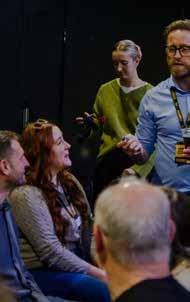
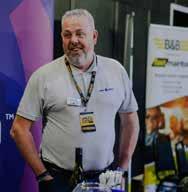
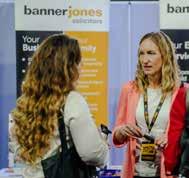

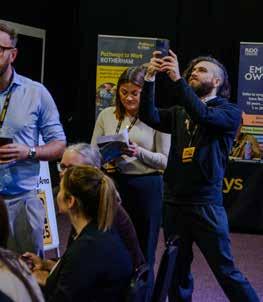




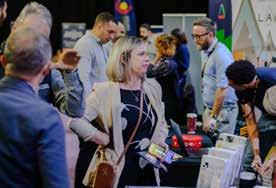


smoothly even when I’m not there,” he explained. That approach recently allowed him to take a full month off for his wedding and honeymoon without pressing pause on work.
His advice was clear: growth doesn’t have to mean hiring or scaling up.
Sometimes it’s about building a business that fits your life, not the other way round.
AI doesn’t replace people – it empowers them
Ryan closed his session with a reminder that sums up much of the day’s conversation: “These tools won’t do the selling for you – they help you do it better.”
Across every talk, from automation to leadership, the theme was the same –technology, teamwork and tenacity work best together.
The Expo proved once again that Sheffield and South Yorkshire are packed with businesses that innovate, share and support one another.
So whether you were discovering new ideas, reconnecting with old contacts or just picking up some free pens, thank you for being part of it.
We’ll see you at the next unLTD Business Expo — and if you fancy joining us as an exhibitor, book your stall at expo. unltdbusiness.com.
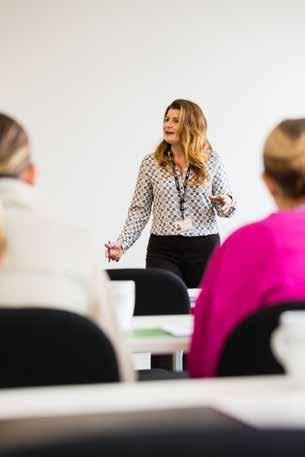


YORKSHIRE’S SMARTEST SKILLS COURSES LEVEL UP!
One-day courses to build your professional toolkit

Simplify the complexities of finance
Gain practical skills and understand your business.
No prior knowledge of finance or accountancy is required.

Elevate data management
Develop a strong foundation in Excel by mastering basic functionalities.
Develop skills to analyse, manage, and visualise data confidently.
JUST £175 PER COURSE OR BUNDLE BOTH FOR £300 (+VAT). Sheffield courses may be eligible for up to 50% funding. Contact us for more details.


BY STEVE BROWN, MD, FLUIDONE BUSINESS IT - SHEFFIELD

Microsoft will officially end support for Windows 10 on 14 October 2025. After this date, no further security updates, patches or technical support will be provided. For UK businesses, this marks a critical deadline – one that presents both risks and opportunities.
The risks of doing nothing
Continuing to use Windows 10 beyond its end-of-life introduces serious risks. Unpatched vulnerabilities become permanent, leaving systems exposed to cyber attacks, ransomware and malware. For organisations operating in regulated industries or handling sensitive data, outdated systems could also lead to compliance breaches. If issues arise, the lack of support can result in costly downtime, loss of data and reputational damage. And the longer businesses delay, the harder and more expensive it becomes to recover from potential incidents.
This isn’t just about avoiding risk. Upgrading to Windows 11 provides a future-ready platform built for modern business needs. Key benefits include:
1. Improved security Windows 11 offers advanced protection through hardware-based security features, enhanced encryption and improved defences against modern threats – helping protect data and reduce the risk of attack.
2. Simplified device management
With streamlined

deployment and easier updates, Windows 11 reduces the pressure on IT teams, freeing up time and resources for strategic priorities. Device management becomes more efficient, even across remote teams.
3. Hybrid working support Designed with flexible working in mind, Windows 11 enables seamless collaboration from anywhere. Integrated tools
help teams stay connected and productive – whether in the office, at home or on the go.
4. Future-ready innovation Windows 11 is built to support AI-powered tools like Microsoft 365 Copilot, unlocking new levels of productivity and positioning businesses to stay ahead of evolving tech trends. By planning your upgrade now, you not only minimise risk but also strengthen
your organisation’s ability to innovate, adapt and grow in the long term.
For more information, you can call us at 01142 923 800 or email sheffieldenquiries@ fluidone.com to get in touch with our experts today and find out how we can help protect your business during this transition.


Contract:







Sector: Catering

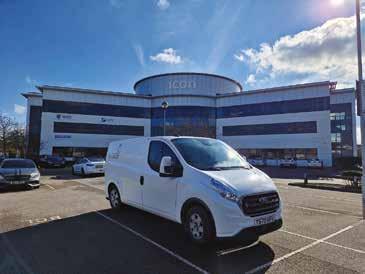









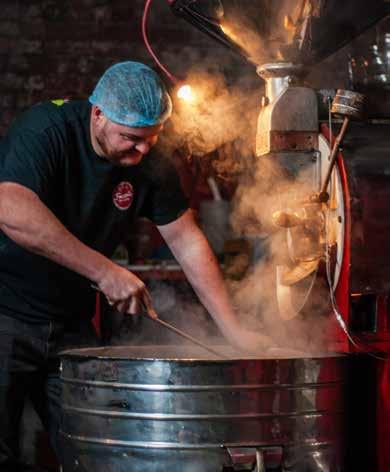

Every roast is a careful balance of temperature, timing and chemistry. It’s about sugar caramelisation, moisture loss and complex chemical reactions – all tailored to highlight the natural characteristics of the bean. Roasters work from detailed data about altitude, varietal and processing method to build a roast profile that brings out the best in each batch.
Hitting the right flavour isn’t immediate – it takes repeated test roasts, constant adjustments and a finely tuned palate. Once a profile delivers the right flavour notes, it becomes a repeatable recipe. Roasters follow it to the letter, chasing consistency across every batch. The difference between success and failure can come down to a single degree.
The sacks weigh 60kg. The equipment runs at nearly 250°C. The environment is loud, hot and full-on. Every roast involves lifting, shifting, loading, monitoring, and occasionally, wrestling with machinery. It’s a hands-on job that needs concentration, stamina and precision – all while working in what feels like a furnace. 1
2 3 4 5 THINGS YOU ONLY KNOW IF YOU'RE A...
Coffee doesn’t come from a bean in the ground – it starts as a fruit, growing on a tree in the tropics. Inside that fruit are two seeds, which are hand-picked, dried and processed before they’re ever roasted. It can take eight years for a tree to produce its first crop. Around 36 cherries go into a single cup of coffee.
Specialty coffee can feel exclusive – but it shouldn’t. Quality and ethics can go hand-in-hand with accessibility. That means showcasing the work of farmers, building longterm trade relationships and keeping the doors open to everyone, regardless of knowledge, background or budget. Our aim is simple: proper coffee, made with care, enjoyed by all.
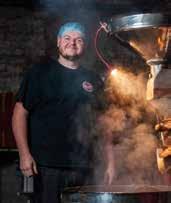
Frazer Habershon is the founder of Frazer’s Coffee Roasters. Pop into their welcome café space at 203 Arundel Street to see the roasting in action, or explore the full range at frazerscoffee roasters.co.uk or scan the QR code on this page.
When the pandemic struck, Lorna Catchpole, like many others, found herself reassessing her career path. After 15 years in housing and community engagement – and having done a fair bit of travelling – she was ready to explore something new. With plenty of perseverance, and a fair bit of scrolling, she found herself on the path to creating her own business.
INTERVIEW: JOSEPH FOOD
“I was looking for a fresh idea, an alternative to just navigating the job market, so I literally searched on Google for ‘business ideas’,” she says. “Number six on the list was gift boxes.”
It was an idea that immediately appealed. “I thought, do you know what? I don’t need premises or a specific qualification; it’s something that I can build. It seemed accessible – something I could start small and grow.”
That spark of curiosity soon grew into Coming From A Good Place – a business that creates customisable gift boxes for companies wanting to thank their staff, impress clients or make a lasting impression at events.
With hardly any business background and few contacts in Sheffield at the time, Lorna reached out to her hairdresser’s sister – a local entrepreneur – to discuss the idea. “We met in a café and started talking about wellbeing and where products come from,” she says. “We were saying how important it is to think about how and where things are made. My business partner said, ‘So really, they need to be coming from a good place.’”
The phrase stuck. “We both just looked at each other and thought, that’s it. That’s the name. It’s a bit of a mouthful, but it’s got meaning. For me, it works on a few levels – it reflects the idea of ‘good’ in the saying itself, is a
nod to products being ethically made or locally sourced where possible, and signals quality and care for the consumer.
“For me, it’s a relief that the name says it all. I don’t need to explain it – people can interpret it in their own way.”
As with many startups, the early days weren’t easy. “It’s taken me a long time to get to the point I’m at today,” she says. “When I found myself on my own, I had to navigate everything, from networking to building a website.”
The website, as she puts it, has been a “journey in itself.” “At one point it was fully coded, which at the time seemed like a good idea. It wasn’t,” she laughs. It regularly needed updates and changes – things I was ready to do, but couldn’t figure out how – and every change came with a price. “I went through several versions before finding a company that was a better fit, who then suggested transferring it onto Elementor with WordPress. Over time, I’ve learned how to load products, edit text and do quite a lot myself. I’ve also had to accept that, either way, the website will always be a work in progress.”
Recently, she’s been working on a new digital ordering system, funded through a digitisation grant. “It lets companies order online through a business portal, with sub-accounts and an order tracking system,” she explains. “It makes tailoring the gift boxes and re-ordering much smoother, and also provides a better payment process.”
“It has been very testing at times,” she admits, “but when the orders come in and you get the positive feedback, you remember how far it has come and just how much potential the business has – it keeps you going.”
IT SEEMED ACCESSIBLE –SOMETHING I COULD START SMALL AND GROW.”
Seeing her gift boxes at the unLTD Expo earlier this year was one of those moments. “It was great to see them being proudly used as a talking point.”
Looking ahead, Lorna’s focus is on sustainable and scalable growth – not just for her business,

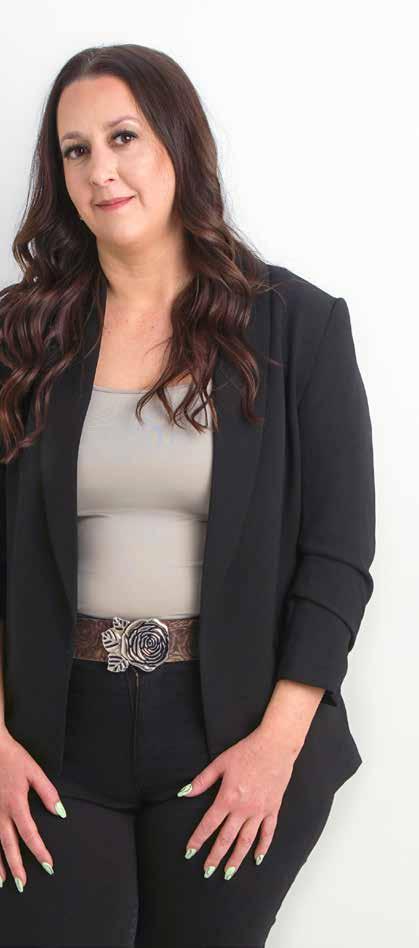


but for others too. “I’ve set up a brand ambassador and affiliate network,” she explains. “It’s a way of bringing people and businesses on board that lets them work flexibly, earn commission and promote the products with their own clients. Added value for all involved.”
The idea was inspired by her lived experience and a curiosity about different avenues and business structures for growth. “I was interested in creating something that could benefit people, freelancers and small businesses by enabling collaboration opportunities, where, rather than relying solely on things like Google Ads or constant social media content, the business could grow. I wanted to build a business that supports growth in a flexible way and brings people and businesses on board in a way that works for them too.”
So, what advice would she give to others looking for their own ‘lightbulb moment’?
“When you’re building something, it’s easy to get overwhelmed. I’ve had times when I’ve tried to do the accounts while tired, making mistakes that just create more work, or dealing with printer issues like leaking ink and not seeing the wood for the trees when looking for solutions. Over time, I’ve realised the value of stepping back – taking a break, watering the plants, going for a run or leaving it until the next day, whatever it may be. A saying I saw on LinkedIn this morning resonated with me: ‘It’s not about how hard you push – it’s about how smartly you navigate the challenges."
Web: comingfromagoodplace.co.uk
Email: info@comingfromagoodplace.co.uk
Follow: @comingfromagoodplace
At the recent unLTD Business Expo, Russ Thompson sat down with Ashley Harris, Managing Director of Jibba Jabba, for an insightful conversation about his journey from Westminster to running a thriving international telecoms and IT business based here in South Yorkshire.
When it comes to business motivation, some people chase money – Ashley Harris chases the challenge. The founder of South Yorkshire-based telecoms, broadband and IT support company Jibba Jabba has built a career on doing things differently, expanding internationally and proving that success comes from passion, resilience and people.
“I’m not a money chaser,” he explains. “I thrive on the challenge. It’s not greed – I’m addicted to it. I just always want the next thing.”
That mindset has taken Harris from a comfortable job in Westminster to running multiple businesses across the UK and the UAE. His route hasn’t been typical, nor has it been easy. “Every single member of my family went to university,” he says. “I was the odd one who didn’t. I quit uni because it wasn’t for me – I’d already self-taught myself most of what I was studying. People told me to get an easy degree, but I knew I’d fail because I just wouldn’t put the effort in.”
Instead, Harris threw himself into work. His early role in the public sector gave him valuable experience – but also frustration. “The problem with the

public sector for me was there were too many meetings and not enough work being done. I just wanted to do what we discussed,” he says. “So, I saved until I had over a year’s salary in the bank, then pushed the button and went for it.”
That leap of faith paid off. Jibba Jabba has grown into a technology partner with clients stretching from Malaysia to Mexico, supported by teams in both the UK and Dubai. Managing operations across two time zones might sound daunting, but for Harris, adaptability is second nature.
“If you’re not changing in technology, you’re behind,” he says. “When I’m in the UK, I’m up at 5am to catch the UAE team before their day ends. When I’m in Dubai, I work UK hours into the evening. It’s challenging, but you get used to it.”
Harris is quick to credit his success to his team. “My happiness is seeing other people happy,” he says. “When I see my staff take ownership, deal with something themselves and come back proud of what they’ve done – that’s my motivation.”
He’s equally passionate about empowerment. “You’ve really got to let the team drive it, because they’re there, they’re on site,” he explains. “I get accused of being too accessible, but I make time for everyone. Everyone’s role is important, no matter where they sit in the organisation.”
This approach seems to inspire genuine loyalty. One of his team in Dubai was offered repeated pay rises to stay with another employer, but still made the move to Jibba Jabba. “I asked him why,” Harris recalls. “He said, ‘Well, it’s working with you, isn’t it?’ That means more than money.”
That humility runs through everything he does. “People tell me I should stop
I THRIVE ON THE CHALLENGE. IT’S NOT GREED – I’M ADDICTED TO IT. I JUST ALWAYS WANT THE NEXT THING.”
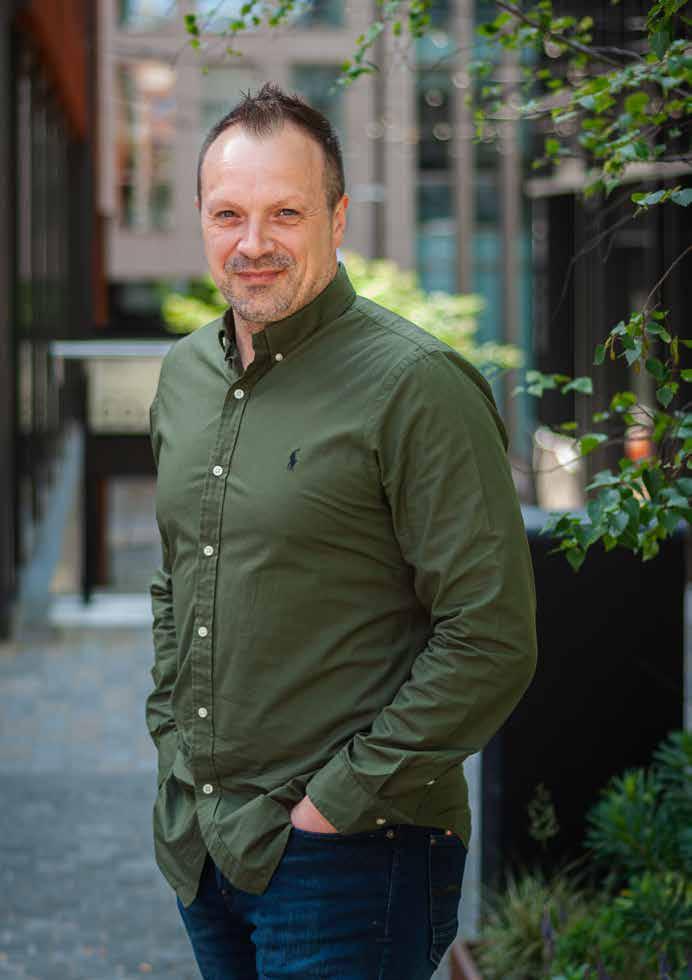


and reflect on what I’ve achieved, but I don’t see it like that,” he says. “I just think about what I’ve done for others. When you get to a funeral, no one looks at your bank statement. It’s about how you helped people.”
Innovation is another hallmark of the Jibba Jabba story. “When we got into VoIP, I didn’t want to resell someone else’s solution. We bought the source code ourselves so we could disrupt the market,” he says. “It didn’t quite work at first – our prices looked too good to be true – but it taught us a lot. I’ve always wanted to do things differently. If you do things differently, you stand out more.”
That mindset isn’t just about technology; it’s about culture. “Dubai has a completely different business environment. Anyone will meet you for a coffee – even a Sheikh. You can’t get past a receptionist in the UK!” he laughs. “It’s all about relationships and respect.”
Harris encourages the same openness within his teams. “I love it when staff challenge me,” he says. “If they didn’t, we’d just do everything my way. You need other perspectives.
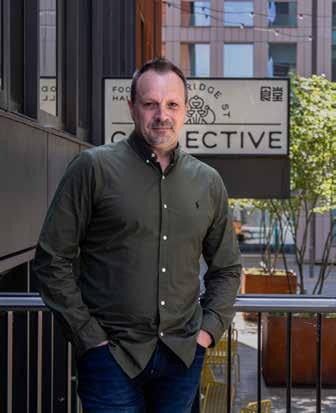

In an age of curated success and quiet comparison, Inside Track is about flipping the script. These conversations focus on honesty over hype, and people who turn setbacks into stepping stones. The aim is simple – to source inspiration, not envy.
To find out more about Russ’s work and how you can join the conversation, visit director-on-demand.co.uk
Sometimes you might not change your decision, but by listening you show respect – and sometimes, they’re right.”
Harris credits his early mentor – a finance director from his Westminster days – with shaping his leadership approach. “He always said, ‘Are you doing your best?’ He pushed me to make better decisions. We all need that person who tells us we can do it.”
He now tries to be that person for his team. “Everyone doubts themselves. Sometimes you just need someone to say, ‘You can do this.’ That’s what I try to do.”
It’s an attitude he’s passing on to his family, too. “I tell my daughter, your GCSE results don’t define you,” he says. “Have time, respect and listen to people – that’s the greatest asset you can have. I got my first client in Dubai through a photographer in Doncaster. You just never know who you’ll meet next.”
SCAN THE QR CODE TO LISTEN TO THE FULL INTERVIEW ON THE UNLTD BUSINESS

SYIP is a £3 million programme supporting organisations across the region to innovate and grow; develop new ideas, improve processes, access new markets, and launch new products.
You can access funding and support tailored to your organisation’s needs, and the stage you are at in your innovation journey:
“I want to innovate, but I don’t know what’s out there”
“I know what I want and it’s available ‘off-the-shelf’”
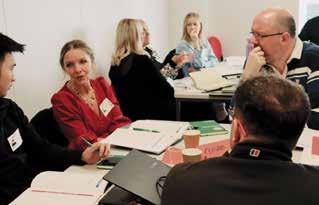
“I know what I want, but there’s no solution on the market”
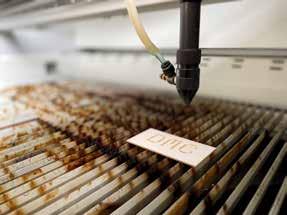

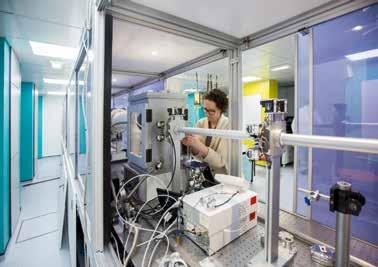
Experiment in the Digital Media Centre MakerLab and CreatorLab. Learn how to innovate at funded workshops.
Access funding to implement an innovative business solution.
Work with sector specialist academics to develop a bespoke innovative solution tailored to your unique needs.






When South Yorkshire firm Bell & Buxton merged with Sills & Betteridge in September, it marked the start of a new chapter – not just for the two firms, but for legal services in Sheffield.
Now operating as Sills & Betteridge incorporating Bell & Buxton in Sheffield, the newly combined team is already seeing the benefits of a merger designed to strengthen local delivery while expanding the range of services available.
“We’d had a presence in Sheffield for nearly four years through our family law practice and subsequent merger with Acclaimed Family Law but always intended to expand into a full-service firm here when the right opportunity came up,” said Richard Bussell, a partner at Sills & Betteridge. “We’ve done the same in other areas since 2007 and Bell & Buxton felt like the right fit.”
That approach of slow and steady growth has seen Sills & Betteridge grow from a single office in Lincoln to 17 across Lincolnshire, the East Midlands and South Yorkshire –including a presence in Sheffield, Doncaster and Wath Upon Dearne. The merger brings the total partners and staff to over 400 across the business, including 200 legal professionals, and significantly broadens what can now be offered to clients in Sheffield.
For Bell & Buxton’s team, the timing was right too. “We recognised the legal landscape was changing, with consolidation happening everywhere,” said former Bell & Buxton partner and new Sills & Betteridge partner, Matthew Rodgers. “We’d already identified
that we needed to be part of something bigger – it was just about finding the right partner.”
That need for change wasn’t just strategic, it was about creating more opportunities for our lawyers. “We wanted to be part of an organisation where they could develop their careers and feel supported for the long term,” said Matthew Rodgers. “Joining a larger firm gives us the scale to offer broader experience, better resources and a more stable environment, all of which ultimately benefit our clients too.”
“It’s also about building a stronger team,” added Alex Ross, now a partner with Sills & Betteridge. “Being part of a larger firm gives us access to a wider pool of expertise and support, which makes a real difference – both for our colleagues’ professional growth and the depth of service we can offer to client. Working alongside a bigger team of lawyers allows us to deliver an even more responsive service to clients, especially in commercial transactions when deadlines are tight.”
Finding the right firm to merge with wasn’t chosen lightly. “We’ve been up against each other in court and transactions over the years,” said Alex Ross. “So, when this came about, we knew them, respected them – and importantly, they weren’t a hard-nosed corporate type just out to asset strip. They actually wanted to keep people and grow.”
Growth, though, doesn’t mean losing what made Bell & Buxton one of Sheffield’s most respected firms. That deep local knowledge and decades of client relationships remain at the heart of the new operation.
Bell & Buxton’s roots in Sheffield

stretch back more than 150 years, the firm was originally founded in 1871 and that heritage remains central to its identity post-merger.
The firm’s modern incarnation emerged from a rather dramatic split in the early ‘80s. “It goes back to 1982 when the old firm dissolved,” said Alex Ross. “One of the partners handwrote a dissolution notice and left it on someone’s desk at lunchtime. Because there was no written partnership agreement, they had to go through a formal dissolution –even auctioning off the assets.”
Out of that turbulent episode, Bell & Buxton was born. “At the time, it was one of the medium-sized firms in Sheffield,” said Matthew Rodgers, who joined in 1997. “Over the years, as other firms merged and expanded, we found ourselves smaller by comparison. That’s when the conversation about our future began.”
“We’ve acted for generations of the same families,” said Matthew
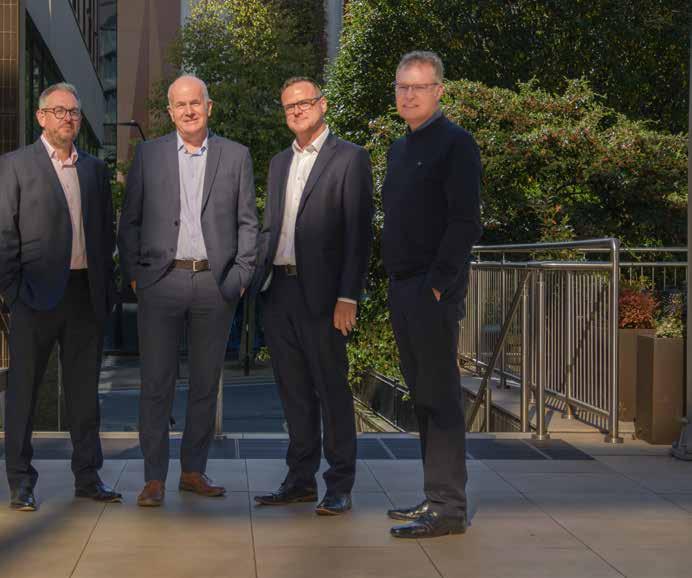
Rodgers. “That kind of brand loyalty means something. Some clients come to you once and that’s it, but many come back again and again – and now we can offer them even more.”
Crucially, the senior team from Bell & Buxton remain at the forefront. “Some mergers are about retirement planning, but that’s not the case here,” added Matthew. “We’re still here, still leading the office, and that was always the plan.”
That continuity has been echoed in the choice to retain the Bell & Buxton name as part of the new identity – something Sills & Betteridge have done in previous mergers too. “We don’t want to extinguish Bell & Buxton – we want to build on it,” said Sills & Betteridge CFO, Martyn Hall. “That name has meaning to clients.”
With legal consolidation increasingly being driven by private equity investment, Sills & Betteridge stand out for being traditionally
partner-owned and managed, with no external investors. That independence has shaped their strategy, focusing on long-term growth and local knowledge rather than fast profits.
“We’re not acquisitive for the sake of it,” said Richard Bussell. “Because we own the business, we only take opportunities we’re genuinely excited about – we have to believe in them ourselves.”
That belief has also translated into positive feedback from staff. “They’ve been really impressed by the benefits,” said Alex Ross. “There’s better in-house training, sponsorship for courses, even things like access to an assistant solicitor that we didn’t have before. It’s made a big difference.”
“We’ve got 20 trainee solicitors across the business right now, including apprentices,” said Martyn Hall. “People have developed their careers with us – we’ve got partners who started in the post room. That
kind of progression is something we’re proud of.”
That sense of building something sustainable and locally rooted came through strongly across the board.
“The days of generalists are mostly gone – now it’s about specialists working together,” said Richard Bussell. “We’ve got experts in most aspects of the law - litigators, property lawyers, corporate experts, even including solicitors who have worked and still work on international deals – and now our clients in Sheffield have access to all that." But with continuity of staff, long-standing client relationships and the same citycentre offices, the message is clear: this is still Bell & Buxton – just with more behind it.
“It’s not about changing who we are,” said Alex Ross. “It’s about giving people better service and better value. Whether you’re an existing client or looking for someone new, just pick up the phone. We’re still here – and we’re ready.”
Improvers SOCIAL DANCING from 5pm
FREE Swing Dance class from 8.30pm
Live music from 9pm
THE BIG SWING IS AN EXCITING NIGHT OF UPBEAT JAZZ AND SWING EVERY WEDNESDAY @ CUBANA’S DOWNSTAIRS COCKTAIL BAR.
“ A
raucous mix of live music
and dancing that everyone can’t help getting involved in!”
The backbone of many fantastic Jazz and Swing acts takes centre stage. Armed not with drumsticks but his Organ and a microphone. Backed by Pierro Tucci, Chris Walker and John Watterson for a night of Jazz and Swing dancefloor fillers. These guys pack a heavy swingin’ sound. 1
WEDNESDAY
Organ-wielding funkmeister Ryan Taylor returns to Big Swing with his trio of equally handsome badasses. Featuring Phil Johnson on drums and Chris Walker on guitar, Ryan and the boys bring rip-roaring, riotous jazz, swing and Latin grooves to get down to on a Wednesday night.


WEDNESDAY
Sheffield’s most loved, long standing swing band. Their music often crosses the genre divide simply because they are so interesting musically. Influences of Hot Club, 40’s swing, Blue note Soul and Sinatra often with Latin rhythms gives them an edge.

WEDNESDAY
Playing classic Swing, Jump-Jive, Ska and red-hot Rhythm & Blues, guaranteed to get your feet tapping and your legs flapping! Thumping slap bass, honking saxophone, raucous four-part vocal harmonies and a driving piano boogie. Playing the hits of Louis Prima, Ray Charles, Louis Armstrong, Nina Simone, Toots & The Maytals, Louis Jordan and more!

WEDNESDAY
Join us for a night of Gypsy Jazz with the heavy Swinging and highly accomplished guitarist Danny Maddocks! Danny’s passion for jazz has taken him to prestigious venues like Birmingham Symphony Hall and Ronnie Scotts Jazz Club. This dynamic trio’s vintage vibes and Gypsy Jazz classics will keep your toes tapping all night long. Sizzling!















When adventurer and broadcaster Ben Fogle, together with Savile Row tailor James Sleater, acquired Buffalo Systems earlier this year, the duo didn’t just take on a beloved outdoor clothing brand – they inherited a four-decade legacy rooted in Sheffield’s manufacturing heartland.
Determined to build on that foundation rather than dilute it, the new owners turned to Business Sheffield for strategic support. Business Growth Advisor Andy Sorsby became a key figure in the brand’s journey to revitalisation – helping the team modernise, optimise and expand without losing the soul of the business.
“Ben was really clear from the outset,” Andy recalls. “He wasn’t just looking for business support – he wanted to understand what he could do for Sheffield as well. He loves the brand, and he’s passionate about manufacturing staying in the city. That aligned perfectly with what we do.”
The support began long before the deal completed. Andy met Ben in October the previous year at Electric Works, where the adventurer laid out his ambitions for Buffalo Systems. “The business had been run successfully for decades by Sue and John, but it needed fresh energy. The new team wanted to look at everything – productivity, skills, innovation – and see where we could help.”
One of the early challenges was the company’s cutting process, which remained highly manual. “It was the bottleneck,” says Andy. “They could only produce so much, which in turn
limited how many machines they could run.”
Business Sheffield helped Buffalo secure a productivity grant to acquire Gerber cutting technology – an automated solution that significantly improved efficiency. “It doesn’t replace people,” Andy clarifies. “It lets people work quicker, cleaner and at higher volumes.”
The grant covered 50% of the cost, amounting to around £7,000. Additional funding supported the purchase of new sewing machines, boosting output further. “Space can be a limitation, but the equipment means they can push that much further.”
Investing in equipment was only half the story. The team also needed upskilling – not only to operate the new technology, but to build internal capabilities across marketing and e-commerce.
“Historically, Buffalo sold almost exclusively wholesale,” Andy explains. “Now, with the new owners, they’re branching into e-commerce for the first time. That’s a huge shift.”
Through the Skills Bank – a South Yorkshire Mayoral Combined Authority (SYMCA) initiative – Andy supported Buffalo in accessing training funding for both Gerber
operation and digital marketing, securing another £5,000 to £6,000 of support. The aim was to equip the existing team with the tools and confidence to navigate this evolution. “I’ve always believed that it’s easier to train motivated people than to recruit from scratch,” says Andy. “And Buffalo has a really passionate workforce.”
With ambitions to increase production, the issue of space loomed large. But rather than pushing for a costly move, Andy worked with the team to optimise what they already had.
“They’d invested heavily in the acquisition, so there wasn’t capital for a major relocation or refit,” he says. “We looked closely at the internal layout and spotted underused office space. By reconfiguring it, we can fit 12 more machinists in.”
Buffalo’s commitment to sustainability and Sheffield manufacturing is also clear in its approach to packaging. Andy put them in touch with Sheffieldbased Criterion Packaging and Sheffield Hallam’s Design Futures team – supported by funding from the South Yorkshire Innovation Programme – so Buffalo is now developing branded, fully recyclable packaging. “It’ll elevate the customer experience and support


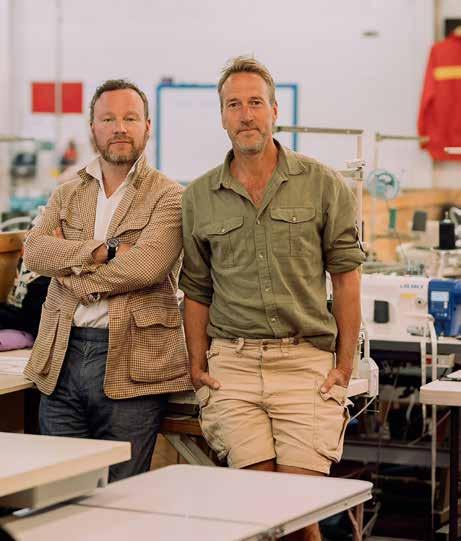


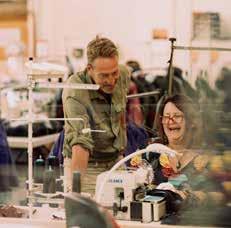
the brand’s premium image,” he says.
The team has also set its sights on a physical presence in the city centre – although that’s a longer-term ambition. “They’d love a retail space in Sheffield, but it’s not the right time yet,” Andy confirms. “However, we’ve helped them secure a non-retail unit on Chapel Walk that can act as a showroom and product development space for now.”
Behind the scenes, there are also plans to build a local skills pipeline to support future growth. “If Buffalo becomes a 150–200 employee business, they’ll need seamstresses – and we need to make sure that talent’s available in Sheffield,” says Andy. Conversations around apprenticeships and broader strategic training are already underway.
And then there’s the “softer” side of support – the networks, introductions and strategic insight that Business Sheffield’s experienced advisors can provide. Whether it’s helping them find people or making links – like connecting them with Pete McKee for a potential art piece for an upcoming TV show on the move – that’s all part of the role.
As the new chapter of Buffalo Systems continues to unfold, the support from Business Sheffield shows how specialist, locally rooted business expertise can help heritage companies step confidently into the future.
“From the outset, it’s been about making sure this iconic Sheffield brand can stay local, grow sustainably and keep its identity,” says Andy. “That’s something we’re proud to be a part of.”
If you’re a business in Sheffield looking for guidance, whether it’s navigating growth, funding, exploring new markets, or simply needing a sounding board, Business Sheffield’s team of advisors are on hand to help. Scan the QR code to find out more.
Now in its 26th year, Vivid Creative has grown from print-era pitches to dataled campaigns. Founder Gerry Arcari talks to unLTD about the business’s roots, impressive growth and the ethos that keeps results coming.
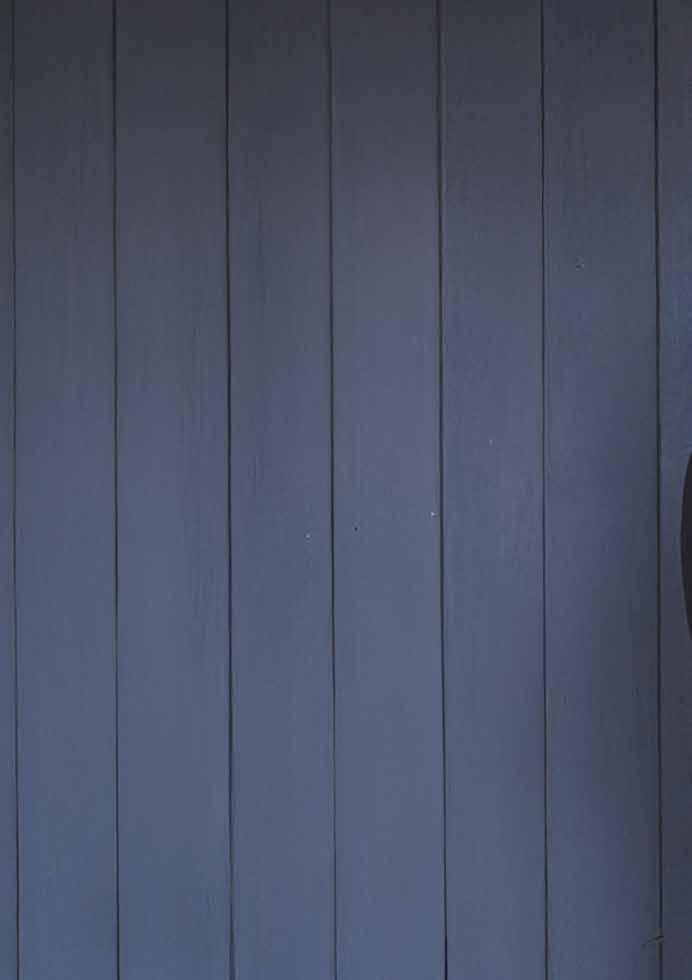
On a chilly weekday afternoon, unLTD drops into Vivid Creative’s Kelham Island base – a light-filled, modern industrial unit where exposed brick and steel meet gleaming iMacs. In a spacious boardroom that feels more like a trendy weekend brunch spot than a meeting room, a neon sign hums away, spelling out “Brands Burn Brighter”.
If you have worked in Sheffield’s creative scene for any length of time, you will have heard of Vivid. The agency’s been part of the city’s business fabric since the early 2000s, led by founder and CEO Gerry Arcari – an ex–outdoor
industry insider who built the business in the late analogue days and steered it through the digital pivot, the social deluge and today’s AI swirl.
Gerry arrived in Sheffield from Kent for university, drawn by the Peak District and the city’s blend of vibrant city and open space. A passionate climber, he became part of the Foundry scene and then moved into the outdoor trade through contacts, first at Terra Nova and later at the now-global outdoors brand Rab, where he found himself deep in product, production and brand –diagnosing manufacturing gaps,

planning production, sponsoring athletes and, crucially, working with agencies. “I worked with a marketing manager who took me into agencies. I loved it,” he says. Back then, marketing meant print. “It was on paper, in magazines and adverts. You had to tell an entire story on one A4 page.” One line from an early bothy bag campaign still sticks with him: “Hell to shelter in seconds.”
By 1999–2000 he had made the leap, setting up Vivid with a creative director he’d worked with, initially out of a house in Castleton then Leeds before returning to Sheffield. Early wins came in the world he knew best. “When we set Vivid up, we were exclusively an outdoor agency. We worked with Pertex and Gore-Tex and Lowe Alpine in eight languages – that was our biggest early contract,” he recalls.
Those first years were highenergy and hands-on. “It was old-school pitching – black boards, spray mount, late nights,” says Gerry. But Vivid quickly moved with the times. “When we first set up, we started building websites. In 2001 we were doing e-commerce and producing proper sites for SMEs – some of them were built in
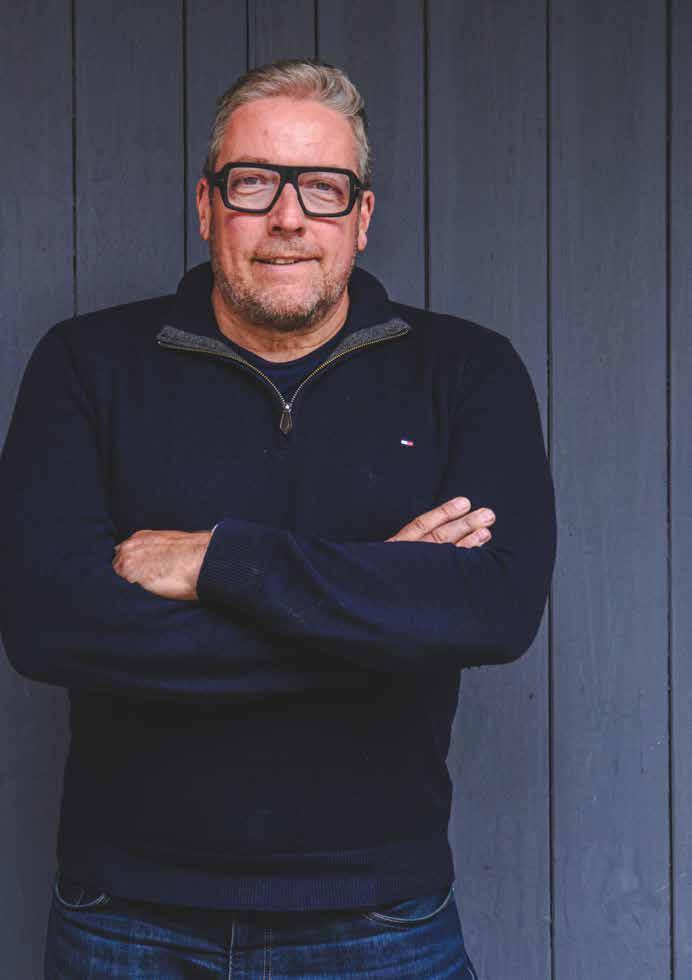
Flash. People could see what was coming and wanted the latest thing. Once a competitor had it, everyone else played catch-up,” he says.
Branding was – and remains –the agency’s spine. “In 1999, we set our roots as a brand and creative design agency and we still offer those services today. Branding is at the heart of everything we do.”
Web and digital capability followed, then a formal performance marketing team in 2019 to cover organic search, social and paid media – a rounded offer built to get results
Like every agency, Vivid had to wrestle with the post-Covid market. Gerry is candid about a leadership misstep that coincided with the shift. “We had a really good year through Covid. I brought in an MD, and I thought we were going to come out of Covid and everyone would say, ‘Thank you for that – let’s go and smash it.’ I was a year too early. That was one mistake I’ve made in this business,” he says. “The agency is smaller today than at its pre-Covid peak, but we’re doing the same amount of work at higher quality.”
A key critique is the volume game that has overtaken social media. “There’s a lot of quantity over quality. I see in-house marketing teams pumping out content, and no one has engaged with it. It’s just filling inboxes,” he says. The answer, he adds, is focus and segmentation – old-school principles applied to modern tools. “It’s about proper targeting – not just throwing it all out in a bucket. Accountability is key, and we’re only as good as our last set of results. We report monthly. It’s tangible now.”
Despite having a range of successful international clients, Vivid’s Sheffield roots run deep. Its Kelham Island studio, situated in the Grade II listed Wharncliffe Works, is a working space and client hub; the portfolio itself includes local heritage and consumer favourites. “We worked on the Thornbridge website and the Hendo’s website –those local links are really important to us,” says Gerry. Recent local collaborations include Integrity Malts, for whom Vivid designed the brand and bottles now seen across city bars. “We work globally, but we love it when small SMEs come to us with problems to solve,” he adds. Further afield, a long-running

relationship with Metallix Refining – a US-based precious metals recycling firm – shows the full-stack model in action. “We rebranded them. We’re on the second website. We’ve built a customer app that’s now in its second version. They recover precious metals from manufacturing and waste, so there was a great sustainability story to tell.”
Ask Gerry what keeps an agency durable and he will start with people – clients and team – then quickly move to process.
THERE’S A LOT OF QUANTITY OVER QUALITY. I SEE IN-HOUSE MARKETING TEAMS PUMPING OUT CONTENT, AND NO ONE HAS ENGAGED WITH IT. IT’S JUST FILLING INBOXES.”
“People are really important, and I like to think Vivid isn’t me,” he says. Long-standing colleagues such as creative director Jon and commercial director Ben are, he adds, “the backbone of the operation”. The culture is studiofirst. “I like everyone to be in the office, which might be a little controversial these days! But I set up Vivid to work with great people and bounce off each other. You
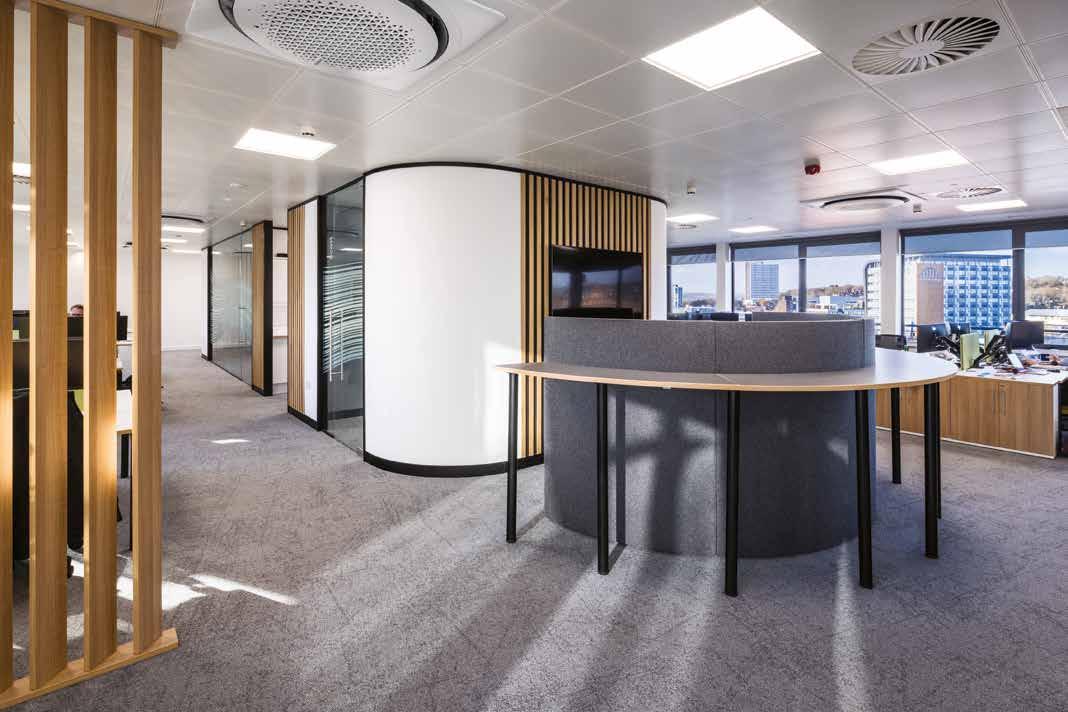






overhear something and save hours through that alone.”
The chemistry only works if the basics are nailed. Retainers are now central after Covid exposed the fragility of a project-only pipeline. “Having retained clients is a must. You can’t rely on winning projects. If retainers cover your base costs, projects then drop in and you can shape the work around them,” he explains.
If there is a through-line from those spray-mount pitches to today’s dashboards, it is discipline and taste – taking the time to think and resisting noise. “Slow down to speed up,” is how Arcari puts it. He is wary of the compulsion to post for the sake of it. The agency’s internal mantra is that marketing spend should feel like an investment, not a cost. “We don’t shy away from anything. Although we’re quite small, we’re perfectly formed, and we do brilliant work. Every job we’ve done has been successful in my opinion,” he says, adding that the firm’s offer is deliberately end-to-end – brand first, then digital and performance to suit.
That belief is grounded in a brand-first view of channels and a practical streak shaped by his client-side past in manufacturing and retail. “I I know the challenges. I’ve got an appreciation of manufacturing and selling to retailers and consumers,” he says. It is why Vivid asks “those difficult questions” before anyone opens

Figma or Ads Manager.
While joking that he’s wary of sounding like a LinkedIn thread, he does not duck advice for those looking to set up their own agency when asked.
“Put the time and graft in,” is the first . In the early years he locked himself in a room for months, hammering the phones for meetings and pitching through the night. “When you set up a business, that’s what you do.”
“Get the best people” – and they do not all need to be on payroll. Vivid has kept a tight in-house team alongside trusted freelancers so capacity can flex without lowering the bar. “We’ve got a really good bank of freelancers and deep
BRANDING IS AT THE HEART OF EVERYTHING WE DO.”
connections in Sheffield.”
“Document everything.” Scopes, deliverables, approvals, ownership – especially where AI tools are involved – need to be explicit. “Statements of work, contracts and AI-aware T&Cs – these are always essential.”
And finally, “have fun”. If the work is a grind, something is misaligned. Studio energy matters – for the team and for clients who step into it. “If you’re not having fun, ask yourself why you’re doing it.”
So, after an impressive 26 years in the game, what’s next for Vivid?
The plan is continuity with evolution – to keep Vivid relevant as channels shift, while setting up the next generation to lead. “I’m coming up to 55. I want Vivid to continue, so I’m setting up the team to lead it forward,” he says. That means staying boutique by choice and doubling down on the agency’s differentiator: senior attention on brand, with creative and performance wrapped around it.
“We move with the technology, and we’ve got experience behind us,” he says as our interview reaches a natural end. “The best thing about an agency like Vivid is the privilege of seeing into hundreds of different businesses. You absorb it. You spot the patterns. You can say to a client, ‘We’ve seen 50 companies like yours,’ and that gives you a kind of superpower. We use that wisdom to cut through, not add to the noise.” vividcreative.com
When Brendan McMenamin moved from Derry to Sheffield back in 2001, he only meant to stay for a few years. The plan was simple: finish his psychology degree, enjoy a bit of the city’s famous music scene, and then head home. More than two decades later, he’s still here – now running one of the region’s most trusted construction firms, LABS.
“I came over thinking I’d get my degree and go back,” he laughs. “That was nearly twenty-five years ago. Sheffield just felt right –friendly people, a bit rough round the edges in the best way, and a spirit that reminded me of home.”
Brendan grew up in Derry in the 1980s, in what he describes as a “multiple-heritage household” –Protestant and Catholic – right in the middle of the Northern Irish conflict. “People hear that and think it must have been difficult, but honestly, it was brilliant. We were a gang of kids riding bikes and playing football until dark. You didn’t have much, but you had each other.”
That sense of togetherness and resourcefulness has stayed with him. After losing his father at just eight years old, Brendan started working early – first in a furniture shop, then behind the bar of a pub in Letterkenny. “We didn’t have loads of money, so you just cracked on. That’s probably where the graft came from.”
By the time he arrived in Sheffield, the pull of psychology made sense. “I was always interested in why people do what they do. After the childhood I’d had, I think I wanted to understand people – and help where I could.” He went on to work in forensic psychology and youth probation, but something kept pulling him back towards more hands-on work.
“I never planned to start a business. It just… happened,” Brendan says. “I’d been managing a
few property projects for family and friends, doing bits of refurbishment, and realised I was better at getting things organised than most people on site. That was the start of it.”
What began as a side hustle doing Legionella assessments turned into LABS, a fully fledged construction and basement conversion company launched in 2016. “It started from spotting a gap – people needed reliable building services that weren’t just turning up, bodging it, and disappearing. The bar in construction was low, and I wanted to do it differently.”
Brendan’s story will sound familiar to plenty of small business owners. “Most of us are winging it, at least at the start,” he says. “You try something, learn the hard way, and pivot when you have to. I don’t buy the idea that successful people have it all mapped out. Half the time, you’re just figuring it out as you go.”
He credits much of his adaptability to growing up in Northern Ireland. “You had to be able to talk to everyone – different backgrounds, different views. That’s served me well in business. I can mix with all sorts, but still be myself.”
That grounded attitude runs through the company. LABS’ team are mostly full-time employees rather than subcontractors, something Brendan’s proud of. “It’s harder that way – more responsibility, more overheads – but it builds loyalty. You can’t create a proper culture if everyone’s just passing through.”
Ask Brendan why he’s stayed in Sheffield so long and he doesn’t hesitate. “It’s the people. You can’t be too up yourself here. There’s humility, humour, honesty – all the stuff I grew up around. It’s got that small-town mentality in the best possible way.”
Even when he briefly lived in Birmingham for work, he’d come back at weekends. “Sheffield’s
home. The Peaks are right there, the community’s sound, and it’s a great place to raise kids.”
That mix of city grit and countryside calm has clearly rubbed off on the business too. “We’ve never tried to be flash,” he says. “It’s about being straight with people and doing what you say you’ll do.”
Looking back, Brendan’s psychology training still shapes how he runs things. “It taught me to listen. Whether it’s a customer, a builder, or a business partner –everyone’s got their own pressures. Understanding that makes life easier.”
His advice for anyone starting out? “Be honest with yourself about what you don’t know. Don’t fake it. Find people who are better than you in certain areas and bring them in. That’s how LABS has grown –good people filling the gaps.”
He’s also learned the importance of pacing yourself. “Running a business is stressful. You can’t do everything. You’ve got to look after your head and your energy. Burnout’s real – I’ve been there.”
Now approaching its tenth year, LABS continues to evolve. Brendan’s joined by Phil Wilson and Karl Howard, long-time colleagues who’ll soon become directors. “I realised the company would be stronger if we ran it together. It’s about sharing the load and keeping it sustainable.”
That openness to change – the same quality that once took him from psychology to construction – keeps LABS moving forward. “I think that’s what entrepreneurship really is,” he says. “It’s not about having a grand plan. It’s about adapting, learning, and keeping your feet on the ground.”
As for what’s next, Brendan smiles. “I don’t know, to be honest. That’s the fun bit. Whatever happens, Sheffield’s home now –and LABS is part of it.”
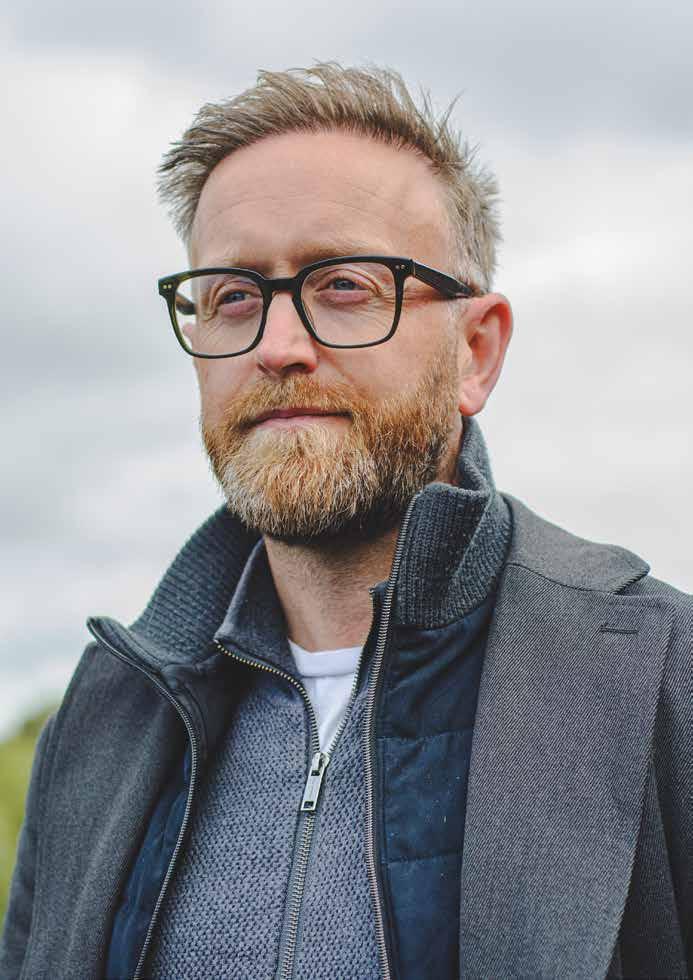
SHEFFIELD JUST FELT RIGHT – FRIENDLY PEOPLE, A BIT ROUGH ROUND THE EDGES IN THE BEST WAY, AND A SPIRIT THAT REMINDED ME OF HOME.”

So Jim, what is Studio Jim all about?
It’s just me – hence the name! I’ve been in the interior design industry for nearly 14 years. I spent ten of those years working as Head of Interiors at another company, but when that business was being sold, I decided it was time to go solo. That was about two and a half years ago now, and Studio Jim was born.
And how’s the solo life treating you?
Very stressful at times – but amazing! It’s that classic business owner scale of ‘Where’s the next job coming from?’ vs. ‘I never say no to anything.’ But I don’t think that churn ever really stops, and I’ve learned to enjoy the ride.
What kind of work do you focus on?
Mainly commercial interiors – so cafes, restaurants, pubs, workspaces, and quite a few opticians, oddly enough! There was a big government push in the 80s for people to open opticians, and loads of those businesses haven’t changed much since. A lot of my work is helping independents refresh those spaces and appeal to new generations. It’s not just about selling products anymore – it’s about experience. People want to walk in and feel something.

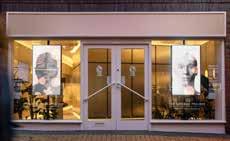
Thinking of giving your business a bit of a glow-up? Say hello to Jim Butterell. unLTD's Joseph Food chats to the man behind Studio Jim, a one-man interior design studio based here in Sheffield.
Are there any local projects people might know you from?
I worked on the interior design for The Sapiens Project in Orchard Square –that was a really interesting one. It was super-fast turnaround but loads of creativity. We built this almost sci-fi imaging chamber – like something out of Star Trek! It’s all about building an immersive space, but still keeping it warm and inviting. I love that balance.
What’s the typical process when a client comes to you?
It usually starts with a chat –often through socials or word of mouth. We talk about what they’re after, what they want to achieve and, of course, the budget (always an awkward one!). A lot of clients are putting their life savings into these businesses, so it’s about building trust. From there, we go through stages: concept,

development, technical drawings, costings – all the way to the final fit-out.
Do you prefer working with clients who come in with strong ideas or blank slates? Honestly, both. Even when someone thinks they know exactly what they want, my job is to find the thread through their thinking. It’s rarely about the image they show me – it’s about what that image represents in terms of how the space should work. And if someone’s got no clue, that’s just as fun.
Any other standout projects?
I did the flagship store for Batch London last year – they sell sustainable suits, made to order. Very cool guys, really creative. I’ve also worked with YesColours, a sustainable paint company – lots of popup stands and showroom work. And back in the day, I did Marmaduke’s on Ecclesall Road. That one felt like my baby; I loved working on that project.
What do you enjoy most about the job?
The moment when it clicks. There’s a whole emotional rollercoaster – “This is great”, “Is this right?”, “I’m terrible”, and then the client loves it, and you remember why you love it. But honestly, after all these years, nothing beats walking into a space that
was just a drawing on my screen 12 months ago and seeing people using it. That amazement never fades.
What would you say to businesses who think hiring an interior designer might be out of reach?
It’s a common worry. People often don’t factor in a designer when budgeting, or they worry it’ll cost a fortune. But in most cases, I end up saving clients money – whether that’s through smart sourcing, knowing how to design around standard material sizes or avoiding costly mistakes. Plus, working with someone small like me means it’s personal. There’s no account manager between you and your designer – it’s just me, and I’m with you every step of the way.
Last one: what makes someone a good fit for this kind of work?
Flexibility. You’ve got to be able to scale up, scale down, pivot quickly – especially with independents. But more than anything, you’ve got to love it. I’m not in this for the money –I genuinely love going on that design journey with people. That’s what Studio Jim is all about.
To see more of Jim’s work or get in touch, head to www. studiojim.co or follow @ jimbutterell on Instagram.


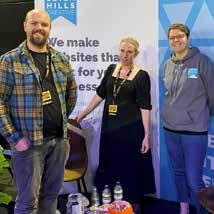


Indoor: Cocktail Making –from £90pp + VAT
Outdoor: Crystal Maze –from £108pp + VAT
Evening: Betrayers –from from £108pp+ VAT
Alternative
Indoor (Sustainability): Terrarium Workshop – from £108pp + VAT Outdoor: Soapbox Derby –from £112pp + VAT
Indoor: Bake Off – from £142pp + VAT
Outdoor: It’s a Knockout – from £117pp + VAT
Charity: Charity Bike Build – from £143pp + VAT
Alternative event options: Charity Sleep Pod
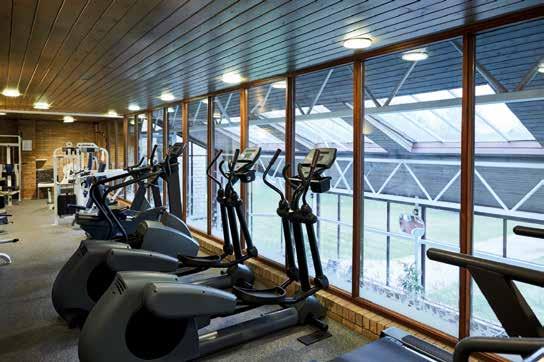

Starting a business is rarely straightforward – but for Chloe Wilkin, founder of Wilkin Design, it was the only option that made sense.
Based in Barnsley and working across brand identity, digital design and social media, Chloe launched Wilkin Design in 2024 after years of side projects, employment frustrations and a deep-rooted ambition to work for herself.
“I always knew I wanted to build something of my own,” she tells unLTD, explaining that her entrepreneurial streak began back at school with a short-lived chewing gum hustle. She later launched an art business while at college, followed by a clothing brand at just 19 years old. While these ventures didn’t last, they helped her realise what she really loved – the creative process itself.
“The bits I enjoyed most were the branding, the logos, the socials. Eventually, I thought, why not just do that for other businesses?”
Her early career was shaped by roles in design, including a UX/UI position at a corporate insurance firm. But the stability came at a cost. The salary didn’t match the workload, and when requests for career progression were dismissed, Chloe made the decision to leave – without a client base, but with a clear goal.
“But it wasn’t just about money,” she explains. “It was about freedom, and building something I believed in. The corporate structure wasn’t’ me at all.”
Since setting up Wilkin Design,
she’s worked with a range of B2B clients, many of them found through networking and referrals. Her work spans industries –from service-led businesses to hospitality – and describes her approach as one of clear thinking and clean, bold visuals that reflect her clients’ values.
Chloe’s approach combines creative instinct with commercial awareness. She’s not afraid to challenge a brief if it doesn’t align with a client’s goals and credits her success to building genuine relationships. “I’m very passionate about business success – not just my own, but my clients’ too,” she says.
That collaborative style paid off in a recent branding project for a South Yorkshire consultant. Presented with a brief that seemed too impersonal, Chloe saw a disconnect between the request and the business’s ambitions. After designing to spec, she also presented a second version – one that she felt better captured the personal brand behind the business. The client chose the latter.
Another recent success came through her work with Two Gates Fisheries, a Barnsley-based fish and chip shop. Through consistent content creation and a clear social media strategy, Chloe helped raise the brand’s profile significantly – with video reach topping one
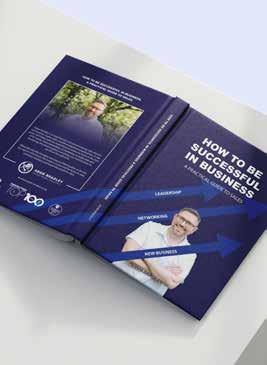

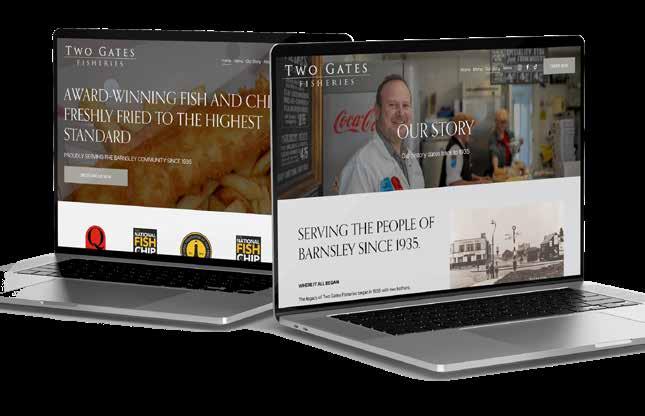

million views in just three months.
The results were more than just digital. In the first 12 months of working together, the client saw an 18% increase in turnover and Chloe estimates a return on investment of between 5 and 9 times, depending on attribution.
She admits self-employment comes with challenges – especially in the early stages – but she values the flexibility and fulfilment far more than any sense of routine.
“Some days you might take a break in the afternoon and work late into the evening,” she says.
“It’s all about balance and knowing what works for you.”
Her long-term ambition is to scale Wilkin Design and her second business, a UX studio, into standalone brands with dedicated teams and physical premises. She’s already begun some outsourcing to trusted freelancers, and has set herself the target of doubling her turnover in year two.
Much of Chloe’s drive stems from her upbringing in Barnsley.
Inspired by her mother’s determination to retrain and build a better life through education, she’s always seen hard work and self-reliance as essential. Growing up in a community with limited opportunities only strengthened her resolve.
As such, she’s mostly selftaught, having learned the tools of her trade through online courses,
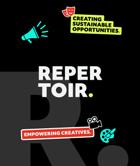


YouTube tutorials and hands-on projects. That path has helped her stay agile and aware of industry trends – something she sees as essential in a fast-moving creative sector.
“Being in the industry is what keeps you current,” she says. “Trends shift constantly, so it’s about learning on the job, not relying on what you were taught years ago.”
Her advice to others thinking about taking the leap into selfemployment? “Just do it. What’s the worst that could happen? If it doesn’t work, you go back to a job – but the potential upside is huge.”
She also warns creatives not to undersell themselves. “Be strict on pricing. Don’t let people lowball you. That’s one mistake I made early on – but you live and learn.”
And with that mix of honesty and quiet confidence, Chloe Wilkin is proving that you don’t need a London postcode or a design degree to build a successful creative business – just a bit of courage, motivation and a clear sense of what matters.
“Success looks different to everyone. For me, it’s about doing what I love, being proud of my work and helping others grow too.”
Web: wilkindesign.co.uk
Email: info@wilkindesign.co.uk
Follow: @wilkindesign
Meet Adam Elder, the new face of Green Shield Group in South Yorkshire, helping local businesses cut costs, lower carbon and take real steps towards a greener future.
PHOTO: MARC BARKER
When Adam Elder decided to change career direction earlier this year, he was looking for something that offered both independence and impact. Just a few months on, he has become Franchisee and Regional Director for Green Shield Group in South Yorkshire – and is already making important connections across the local business community.
“I can tell you that it’s been so far so good in terms of the community I’m getting myself involved in,” Adam says. “Many of the people I’m speaking to are already very passionate about sustainability and doing their bit.”
Green Shield Group is a renewable energy consultancy that works with organisations of all sizes to reduce costs and cut carbon. From solar installations and battery storage to voltage optimisation and efficiency measures, the group takes a data-driven, transparent approach to helping clients make the right decisions for their business.
For Adam, the appeal lies in being able to make a tangible difference. “If I can help a few companies make positive changes, I’m not only helping them save money, but I’m helping them protect the environment around them. It’s a genuine game-changer.”
Originally working across Europe in IT and cyber security, Adam has been struck by the welcome he has received since turning his focus to South Yorkshire. “Super friendly – that’s how I’d describe the business community here,” he says. “If I’m talking about sustainability or renewable energy, everyone is super positive from the off and it makes my job much more enjoyable!”
That enthusiasm reflects the region’s reputation as a green hub. Sheffield is often described as one of Europe’s greenest cities, with its wealth of public parks, the Peak District on its doorstep and an outdoors culture that values sustainability.
For many organisations, the challenge of reducing energy bills and emissions can feel complex. Adam stresses that
the starting point is always a simple conversation.
“You start off with baby steps,” he explains. “The first step is always a discovery call – a simple conversation about what the goal is. Is it carbon reduction? Is it to save money? Typically, nine times out of 10 it’s probably both. But it could also be supply chain pressure – a lot of big companies are asking their suppliers to show progress on sustainability, so SMEs need to get on board.”
From there, Green Shield Group looks at the data – from energy bills to half hourly usage – to design solutions that are genuinely tailored. “It’s about honesty and transparency,” Adam says. “We don’t preach. We make recommendations based on data. You should end up with a system designed for what you need.”
That might mean a solar installation, battery storage or voltage optimisation – a technology that reduces wasted electricity by matching supply more closely to actual usage. “Voltage optimisation can often deliver immediate savings of around 10 per cent with minimal disruption and relatively low implementation costs”, Adam notes. “For smaller businesses, it’s a really effective first step.”
One of the misconceptions Adam often hears is that solar doesn’t work in the UK climate. “That’s not true. Solar panels work on daylight, not heat. Obviously on a bright sunny day they’ll perform better because of the longer days, but even in winter they’re still generating.”
Another industry issue is overpromising. “You hear claims of guaranteed 40 or 50 per cent savings without even looking at the data, or whether the longer-term investment makes financial sense. That’s not how we work. We’ll give you the realistic analysis, based on actual usage and credible modelling; we design the systems that are right for your business.”
As a franchisee, Adam benefits from the


MANY OF THE PEOPLE I’M SPEAKING TO ARE ALREADY VERY PASSIONATE ABOUT SUSTAINABILITY AND DOING THEIR BIT.”
backing of Green Shield Group’s national expertise – project managers, engineers and designers with years of experience. That allows him to focus on building relationships locally.
“If I didn’t have that support, it would probably take me two or three years to get to this point,” he reflects. “Instead, within a few months, I’ve got the resources to provide turn-key delivery of sustainable projects for South Yorkshire businesses.”
And while installations can be largescale, Green Shield Group prides itself on being agile. “We don’t want to disrupt a business’s day-to-day operations. A typical solar project might take four to six months from start to finish, but downtime can be as little as a one hour.”
For Adam, the priority now is getting to know more businesses and making introductions. “My main aim is to have as many conversations as possible about why Green Shield Group can help,” he says. “If you’ve got an energy bill and you think, I don’t want to pay that much, it’s worth a chat, sometimes the simple solutions are out of reach if you aren’t aware of them –Voltage Optimisation is a prime example of this.”
He’ll be attending Chamber of Commerce events and local networking sessions in the coming months, with the aim of building his presence in the region. “I hope that I can become the go to name for renewable technology. I know what we do and what we provide – it’s solid business advice - it’s everything you need to make an informed decision.”
For South Yorkshire businesses facing rising energy costs and pressure to go greener, Adam Elder and Green Shield Group could well be the trusted partner to help chart the way forward – and it’s always worth an exploratory chat to see what’s possible.
CONTACT ADAM
E: a.elder@greenshield.group T: 07472623297
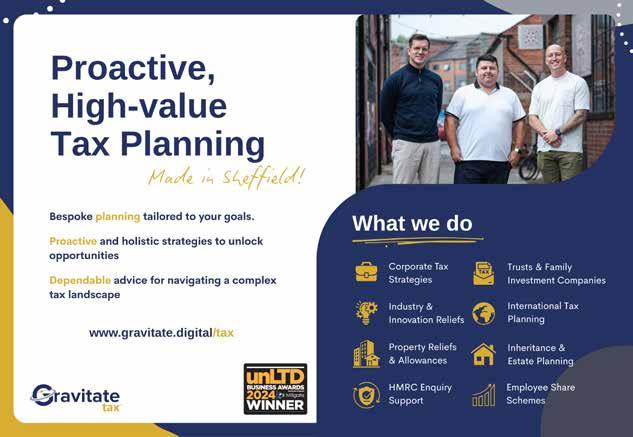



Harry Harrold, Director at H Harrold and Sons – Sheffield’s longest-serving locksmiths –explains why physical security still matters in a cyber-focused world.
In today’s world, cyber security rightly commands headlines and boardroom budgets. Yet the age-old threat of burglars targeting premises and stock remains as potent as ever. According to the Office for National Statistics, robbery of business property surged by 50% between March 2024 and 2025, reaching 15,520 offences.
MLA-approved H Harrold and Sons has been Sheffield’s locksmith and security expert since 1919, and we’ve seen security practices and technology evolve. But some things remain constant – and one of those is the need for robust physical security. As you harden your network perimeters, make sure you’re not leaving your physical perimeter wide open.
HERE ARE FIVE PHYSICAL SECURITY TIPS TO KEEP YOUR BUSINESS SAFE:
1. Control Access
Upgrade locks and key systems – Invest in highsecurity cylinders and patented or restricted key systems to prevent unauthorised copies and maintain full control.
Manage staff access properly
– Use master key systems or electronic access control so staff only reach the areas they need, and lost keys can be dealt with quickly. Choose quality over quick fixes – Cheap locks often fail when tested. Opt for Secured by Design (Police Preferred) and Sold Secure products for genuine peace of mind.
2. Strengthen Perimeter & Surveillance

Secure the perimeter
– Lighting, CCTV, and controlled entry points act as strong deterrents before an intruder even gets near your building
Install security cameras –Strategically placed cameras, both inside and outside, deter criminals and provide evidence if an incident occurs. Don’t forget internal areas
– Lock sensitive rooms such as server spaces and equipment stores to prevent unauthorised access.
3. Protect Assets & Data
Protect documents and data, not just cash – Fire safes, data safes and secure cabinets safeguard records, backups and other valuables.
Secure physical assets –
Store laptops and other portable devices in locked cabinets or safes when not in use.
Keep digital assets safe –Network devices and servers should be in secure rooms.
4. Set Clear Policies
Develop security policies –Document clear procedures for locking doors, reporting issues, and managing visitors. Define access protocols –Specify who can access which areas, how credentials are issued, and the process for revoking access when staff leave.
Outline incident response steps – Provide clear guidance on what to do in case of a breach, theft or suspicious activity.
5. Stay Vigilant & Review Regularly


Encourage vigilance –
Remind staff to be aware of their surroundings, report suspicious behaviour and follow security protocols. Monitor systems – Regularly test and review your security systems and procedures to ensure they remain effective. Schedule walkthroughs –Arrange these with a qualified locksmith, like us, to identify vulnerabilities before criminals do.
Physical and cyber security aren’t rivals – they’re partners in safeguarding your business. A robust IT firewall won’t stop a smashed window, just as a high-security lock won’t block a phishing email. By treating these disciplines equally, you build a truly resilient defence.
At H Harrold and Sons Locksmiths, we’ve been protecting Sheffield businesses for over a century. Whether you need a full security review, an emergency lock change, or expert advice on access control, our team is ready to help you secure every angle. Call us on 0114 272 4742 or visit hharrold.co.uk to discuss your needs today.
From backpacking to brand-building, Jim Rose turned a love for Vietnamese coffee into a bold UK business – and learned the hard way that growth without focus comes at a cost. Now, with a new roastery and clear mission, Năm Sông is filling a gap in in the market with its standout brews.

What started as a post-university passion project has become one of Sheffield’s most distinctive food and drink brands – and now, Năm Sông is entering a bold new phase. The Vietnamese caférestaurant, founded in 2017 by Jim and Melissa Rose, is doubling down on its original inspiration: a love of Asian coffee culture and a mission to put it firmly on the UK coffee map.
Their latest move? A new roastery space in Kelham Island, which will serve as the production and distribution hub for a growing range of specialty coffees sourced exclusively from Asia.
“To our knowledge, we’re the only company in the UK specialising in Asian specialty coffee,” Jim tells unLTD. “Vietnam is the world’s second-largest coffee producer, but it’s rarely part of the conversation when it comes to high-end brews. We want to change that.”
Jim and Melissa’s journey began with a backpacking trip across Southeast Asia. It was their first day in Saigon when they encountered cà phê sữa đá – Vietnamese iced coffee made with condensed milk –and the experience stuck with them.
“I’d never tasted anything like it –chocolatey, caramelly, sweet but strong,” Jim recalls. “We got back to Sheffield and joked about opening a café. But then we thought: why not?”
Armed with a business degree, a start-up loan and practically no industry experience, Jim opened the first Năm Sông in Broomhill at the age of 23. “We didn’t do any demographic analysis or market research –we just saw a site was available and went for it. It had been left empty for two years. There were dirty dishes in the sink. It was a real baptism of fire.”
What followed was a period of success then rapid expansion. Between 2018 and 2022, Năm Sông launched new locations in Cutlery Works, Dyson Place and Leeds city centre. The business was buoyed by early success and even attracted investment through a Dragons’ Den-style pitching programme. But behind the scenes, cracks were forming.
“We grew too fast without enough money or structure,” Jim admits. “I thought because we had a good idea, we could just scale it and figure the rest out later. But the reality was constant stress – for us and our team. We had three venues, three sets of problems, and no time to fix any of them properly.”
Eventually, the couple made a tough but necessary call – to scale back operations and return to a single, manageable site in Broomhill.
“It was a major turning point for us,” recalls Jim. “We asked ourselves if we were happy – and we weren’t. Going back to one site let us refocus, rebuild, and re-centre the business around the things we care about the most.”
That reflection led back to where it all started: Vietnamese coffee. “Even though Năm Sông is technically a restaurant now, the thing we sell most is phin filter coffee, It’s our cornerstone product.”
The phin filter – a gravity-fed brewing method used widely in Vietnam – has become central to the Năm Sông brand. “It creates something between a filter coffee and an espresso,” Jim explains. “It’s sustainable, easy to use at home and produces a really distinctive flavour.”
The team has launched an instructional content series across social media to help customers brew their own phin coffee.

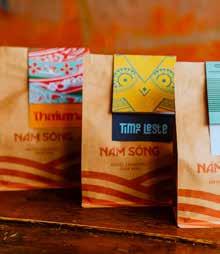




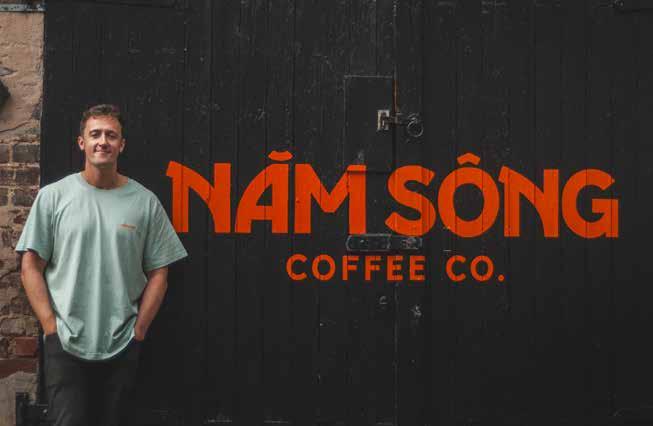




They’ve also expanded their product range, which now includes stainless steel phin filters (priced at £14–£20), Asian-grown beans and full coffee sets.
The Kelham Island roastery marks a significant evolution for the business, with the new space supporting a push into wholesale and e-commerce as a packaging, warehousing and creative studio.
They are importing beans directly from across Asia – including Thailand, Vietnam, China, India and the Philippines – and roasting them in small batches. Jim has trained with local roasters to master the process. “There’s a lot of science to it – heat, humidity, sugar caramelisation. It’s been a steep learning curve.”
Beyond the technical side, Jim sees the roastery as a platform to raise awareness. “The specialty coffee market is dominated
by South American and African origins. Asia is almost completely overlooked, yet the quality now coming out of the region is phenomenal. We want to shine a light on that – and challenge the idea of what great coffee looks like.”
Now in his early thirties, Jim is candid about the lessons learned along the way.
“If I could give advice to my 23-year-old self, I’d say: it’s okay to grow slowly. Take time to refine your operating model, build your team, and make the first site as good as it can be before expanding. We didn’t do that – and we paid the price.”
Still, he has no regrets. “You make mistakes, but you learn. We’re better business operators now, and the model we’ve ended up with is stronger, more resilient – and more enjoyable.”
namsong.co.uk // @wearenamsong




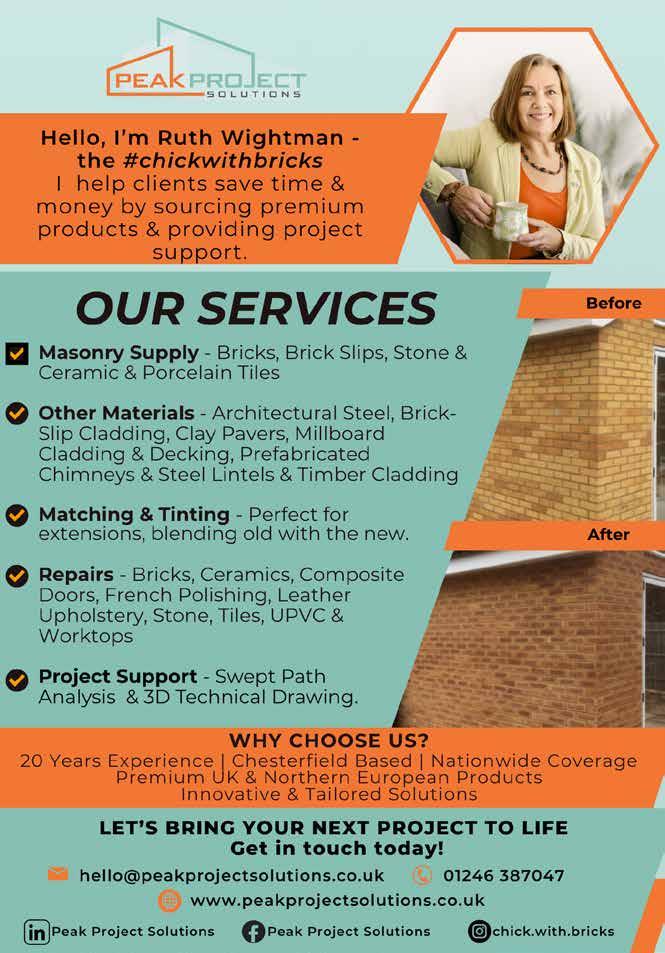
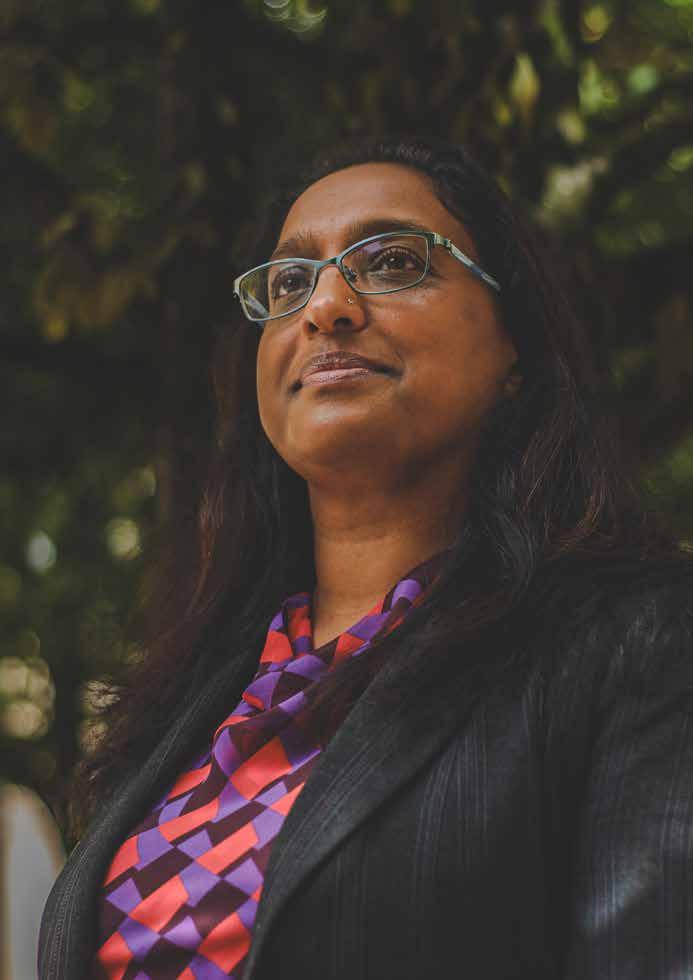
AT THE END OF THE DAY THOUGH, PEOPLE ARE PAYING ME FOR LEGAL ADVICE. I GIVE HONEST, CLEAR AND REALISTIC ADVICE FROM THE OUTSET, EVEN IF IT’S NOT ALWAYS WHAT THEY WANT TO HEAR
Each month, we hear stories from the people behind the law degrees at 145-year-old, South Yorkshire-based law firm, Banner Jones. Most recently, we spoke to Senior Solicitor Shetal Gudgeon about her work in family law, her route into the profession, and how she balances the demands of such sensitive work with family life.
Can you tell me a little about your role at Banner Jones and what you specialise in?
I’m a Senior Solicitor in the Family Law department. I deal mainly with children’s cases, though I also cover divorce and finances. Because I’ve been doing this for a long time and have a lot of experience, I often work on more complex children’s cases where there are issues of domestic abuse or safeguarding concerns.
I guess ideally you’re wanting to avoid court with cases involving children?
Yes – with children’s cases you’ve got to focus on the child, their welfare, stability and happiness. Sometimes, when people are going through a separation, they can lose sight of that because it’s such an emotionally charged time. My role is to guide them through that process and keep it focused on what’s best for the children. I always say knowledge is power – even if you’re unsure, come in and have a chat. I can explain the law, what your rights are, and look at ways of resolving things through negotiation, mediation or round-table meetings before court becomes necessary.
There must be a balance between listening and being realistic?
I’m not presenting myself as a trained counsellor, but there is an element of listening and being empathetic. At the end of the day though, I am being instructed for legal advice. I give honest, clear and realistic advice from the outset, even if it’s not always what they want to hear. Some clients struggle with that, because they’re focused on their own needs, but ultimately it’s about keeping things on track and not making an already difficult situation worse.
How did you first get into family law?
I studied law and did my Legal Practice Course (LPC) in Sheffield. After a year out working in hospitality, I started my training contract in Barnsley. During that time, I had seats in different departments, but I found myself really drawn to family law. I enjoyed speaking to people, hearing their stories and being able to help them at such a personal level.
And you met your husband during that time as well?
Yes – we actually met while working at a restaurant in Sheffield. We both carried on with law and even did our LPC together. It’s funny, because at one point I thought about staying in hospitality as a career – I really enjoyed the sociable side of it – but in the end law was where my heart lay.
You spent some time working in Manchester too?
Yes, my husband and I moved there for about five years. I worked in Longsight, which is such a melting pot of different communities – I learnt so much during that time.

One of the most important cases I worked on was helping a 15-yearold boy with learning disabilities who had been wrongly detained in an adult immigration centre. We had to go to the High Court to get him released. That case really stayed with me – it showed me the importance of what we do.
How do you manage to separate work from home life, especially with such sensitive cases?
When I’m at work, I’m at work –when I’m at home, I’m at home. Once I had my children, that separation came quite naturally, because being a mum took over when I was off. I took nine months with each child before returning part-time (4 days a week), which has always worked well for me and my clients. Having a commute also helps to draw that line. Working from home during Covid made that harder, because you’re suddenly dealing with very sensitive issues at your dining table. Now, if I do work from home, I make sure to close the laptop, pack everything away and compartmentalise.
And how are you feeling about where you are now in your career and life?
I feel very happy where I am. Banner Jones has been a great fit – I enjoy the culture, the support, and the work that I do. I’ve been qualified for over 20 years, and I know my strength lies in working with clients and helping them through difficult times. With my children now teenagers, my husband and I have a bit more freedom again, which gives a nice balance both at home and at work.
bannerjones.co.uk
Whatever you think of Artificial Intelligence (AI) there is no denying that it is here to stay. Working within the creative industries sector, the subject of AI is still a hot topic of conversation at Foster & Scott, with varying opinions amongst our team.
With AI now fully integrated into Adobe products and other creative tools used by design and marketing agencies, Foster & Scott have mastered the art of the prompt to ensure we can harness AI for the benefit of our clients. Interesting concepts have been created and ideas generated by knowing how and when best to use AI.
It Can Go Spectacularly Wrong!
However, AI doesn’t always get it right. We see this in work produced by clients that use it. Platforms built for marketing teams that are integrated with AI for design, layout and copy, making teams more efficient, but when it comes to print there can be technical issues. Recently, a new client came to us after creating entire brochures and banner designs using AI, all their hard work had gone to waste and the job couldn’t go to print because of technical errors. Issues don’t stop at print, a client attempted to write their own website code and completely broke their company’s website.
Luckily we were here to fix the error and get the site back online.
Within the media there has been lots of public shaming and well publicised AI disasters such as Guess Jeans with their fake flawless model and the Coca Cola Christmas advert that faced a backlash of it being “soulless” and “devoid of any actual creativity.” –harsh words which no brand would want to fall foul of.
HERE ARE A FEW OTHER WAYS THAT THINGS CAN GO WRONG WHEN USING AI:
Branding Chaos
AI doesn’t understand your brand guidelines — it just takes creative liberties. One day your logo’s purple, the next it’s floating in space. Consistency isn’t exactly its strong point.
The Bias Blunder
Because AI learns from the internet (which, let’s face it, isn’t the best role model), it can sometimes generate images that are unintentionally biased or stereotypical. That’s not a great look for any brand.
Copyright Confusion
AI might “borrow inspiration” from existing artwork, which is a polite way of saying you could end up with a Picasso-style lawsuit on your hands. Agencies know how to keep your creative assets legal and above board.
Visual Glitches
You’ve probably seen them: hands with six fingers or physics-defying

THE COCA COLA CHRISTMAS ADVERT FACED A BACKLASH OF IT BEING “SOULLESS” AND “DEVOID OF ANY ACTUAL CREATIVITY.” – HARSH WORDS WHICH NO BRAND WOULD WANT TO FALL FOUL OF
shadows. AI doesn’t always do anatomy or realism particularly well — and video adds even more room for chaos.
Tone Deaf Moments
AI doesn’t get humour, irony, or nuance. It might nail the visual but completely miss the emotional point. The result? A perfectly polished ad that somehow feels off.
Why You Still Need Human Experts
At Foster & Scott we use AI in conjunction with traditional skills, experience and knowledge which ensures we know when and how to bring AI into our projects.
SO, WHAT DO EXPERT AGENCIES DO THAT AI CAN’T? QUITE A LOT, ACTUALLY…
Strategic Thinking
Humans understand audiences, timing, and emotion, things no algorithm can replicate. Agencies make sure every visual fits the campaign’s story, not just the prompt.
Creative Direction
AI can paint a picture, but it can’t art direct. Agencies ensure colour, composition, and messaging all align with your brand’s identity (and that your CEO doesn’t have extra limbs).
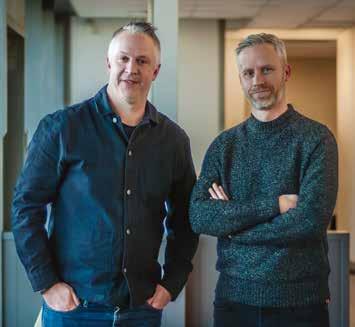

Technical Expertise
Agencies know which tools produce the best results — and how to polish the rough edges. They can blend AI output with real footage, refine lighting, and make sure everything looks professional rather than experimental.
Legal and Ethical Oversight
AI can be a legal minefield. Agencies help you navigate copyright, model rights, and data use so your content doesn’t land you in hot water later.
Quality Control
The human eye spots things algorithms miss — like subtle distortions, awkward poses, or emotional misfires. It’s the difference between “good enough” and “wow.”
Balancing Creativity with Common Sense
There is no getting away from the fact that AI is now part of all our working lives and can provide speed and inspiration. However, creative agencies still need to have the knowledge and experience to get the right results as everything is in the detail. An expert agency knows how to blend these strengths; using AI to explore ideas, and accelerate production, whilst keeping designers and developers in control of quality, tone, and brand alignment.
That’s why working with an agency like Foster & Scott matters. Find out more about how you can get involved at fosterandscott.com.






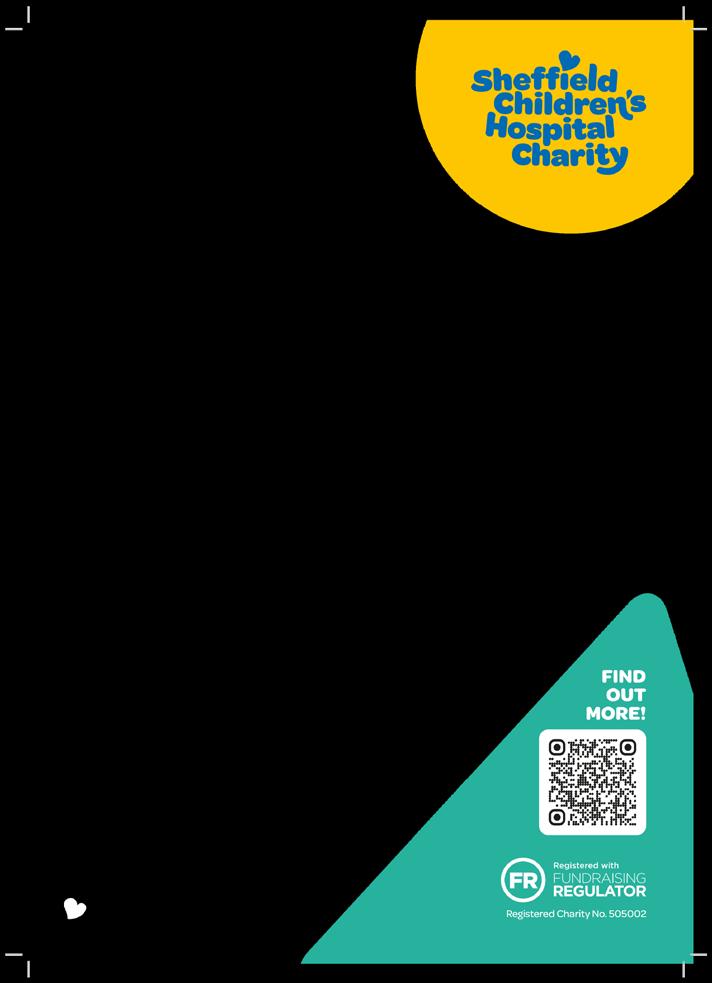
We head into the lion’s den for the making of the region’s next big sculpture trail
When the Pride of Yorkshire trail roars into life in Summer 2026, visitors will see 150 lions and 150 lion cubs brightening streets across Sheffield, Barnsley, Rotherham and Doncaster. But behind the scenes, the real roar is coming from a Sheffield workshop where each one is being brought to life – with a lot of elbow grease and even more pride.
That workshop is Simpsons Patterns, a small but mighty team with a 20-year track record of craftsmanship. They were also behind the Bears of Sheffield back in 2021 – and they’re back for this much bigger sequel.
For Director Alex Goddard, who started at Simpsons as an apprentice, the Bears project was a defining moment.
“It was brilliant. I just remember everyone in the city talking about it at the time –the buzz and the feel around the city – it’s a vivid memory.”
“We ticked a lot of boxes for the charity. We could do the scanning, right through to creating the patterns and the high-quality GRP models at the end of it.”
This time around, the pressure is on – and the scale is next level.
“The Pride of Yorkshire is the same sort of manufacturing process as the Bears, but this is on another level. There’s a lot more production planning needed.”
“We were already at full capacity before the project – so we’ve brought two new guys in. The project is helping us grow. It’s now a three-man team on the lions; two are making them and another one sprays them and gets them ready for delivery.”
So why come back for more? For Alex, it’s personal. “The number one thing is the story and the meaning behind it – Sheffield Children’s Hospital. A lot of us here are

Sheffield people. So it’s close to everyone here. It’s something you’re proud of.”
“From a business perspective, it’s a fantastic project to be involved in. Especially with the exposure your business gets. You get vision and visibility over a longer period. We’ve got 18 months to do this project, and it will have everyone in South Yorkshire interested and talking about it.”
In the workshop, Connor Walsh is leading the handson build. He’s deep in GRP (glass-reinforced plastic) production, which is, frankly, graft. “We get the moulds off the pattern makers, we give it a couple of coats of release agent so it doesn’t stick, then gel coat, then a layer of 300g matting to give it the shape and get the air out, then 600g matting. We do it all in individual pieces, then we use a bonding agent and strips of fibreglass, so it’s not going to fall to bits. We need to make sure they’re solid.”
“We’re nearly done on the males. We have three left to
do this next week. 50 females and 100 cubs. Hoping to finish at the end of December.”
Will he be glad when the male lions are done?
“Oh yeah, the head’s a nightmare! I can’t wait!”
“It’s a hard job to do. It’s a very tricky mould to get in. Just making it is hard. There’s a lot of tight spaces in the legs, especially. You’ve got to get your arm in it to get the air bubbles out. We have overalls on, but you get covered in resin. It’s intricate work to make sure it’s spot-on. It’s harder than it looks, but it’s 100% worth it.”
“I’ve got a young daughter myself who’s three years old –and she’ll more than likely be going to the hospital at some point. So, if we can generate that much money for it –that’s brilliant. Once they’ve been painted and you see them, it’s unbelievable. To see them get transformed again, I’m sure my daughter will love to see what her dad’s made.”
Before any fibreglass is laid, it all starts in digital. Joe Faulks, one of the CAD engi-
neers at Simpsons, said: “We were given three small figures to scan and produce a mould from, which took a couple of weeks.”
From CAD screens to sticky overalls, the scale of the operation is matched only by the passion. Asked what makes Alex proud to be from Yorkshire, he doesn’t hesitate:
“I just think it’s the people. Yorkshire people have that Yorkshire grit and determination. And when we have to –the people of Yorkshire come together and get behind things. I’m hoping that’s what people do with this project. Let’s pull together, get stuck in, and get involved!”
Cheryl Davidson, Project Lead for Pride of Yorkshire, adds: “We’re proud to have Simpson Patterns on board. Their craftsmanship is turning our vision into reality, making the creation of the sculptures feel effortless and inspiring.”
The lions hit the streets in summer 2026 raising funds for Sheffield Children’s and giving the region another chance to come together.
Sheffield’s business and sporting communities came together at Cutlers’ Hall for the city’s first Sporting Lunch – raising an impressive £47,500 to support young people across the region.
More than 350 guests attended the inaugural Sheffield Sporting Lunch, held at the iconic Cutlers’ Hall and proudly sponsored by local consultancy EDGE. The celebration brought together business leaders, sporting legends and special guest Sir Geoff Hurst – still the only footballer to score a hat-trick in a World Cup final.
The event raised vital funds for four Sheffieldbased charities – Fuse Alternative Provision, Links Sports Trust, Net4All and Always an Alternative – all of which provide transformative education, sport and

mentorship opportunities for young people in the city.
Nick Phelan, Director at EDGE, said: “It’s been a fantastic occasion that not only celebrated sport in our city but also raised vital funds for some truly incredible charity organisations.
“To see the city’s business
community come together in this way has been inspiring. At EDGE, we’re committed to giving back and creating opportunities that make a real difference.”
Alongside Sir Geoff Hurst, guests were joined by a host of Sheffield sporting icons – including Mel
Sterland, Tony Currie, Imre Varadi, Carl Asaba, Terry Curran, John Lowe, and TV favourite Tommy Cannon. Entertainment came from award-winning comedian Lea Roberts and MC Alan Keegan, the voice of Old Trafford.
The event featured a charity raffle and auction, with signed sporting memorabilia helping to boost the fundraising total to nearly £50,000.
Francesca Hanson, Director at Fuse Alternative Provision, praised the impact of the event: “The generosity and community spirit on the day were incredible. The funds raised will have a real impact on the young people we support. We’re so grateful to EDGE and everyone who attended for their kindness, passion and commitment to making a difference.”
EDGE, a South Yorkshirebased multi-disciplinary property and construction consultancy, has completed its role on a groundbreaking new stroke rehabilitation facility at Doncaster and Bassetlaw Teaching Hospitals NHS Trust (DBTH).
The Phoenix Therapy Suite, which opened this week at Montagu Hospital’s Fred and Ann Green Rehabilitation Centre, offers stroke survivors access to cutting-edge therapies previously unavailable on the NHS. The new facility combines advanced robotics and interactive technology to support walking, arm and hand movement, and cognitive recovery – helping patients regain independence and improve long-term

outcomes.
EDGE provided costmanagement services throughout the project, ensuring it was delivered efficiently, within budget, and with maximum value for the Trust and its patients.
Brad Fella, Senior Cost Manager at EDGE, said: “We’re incredibly proud to have supported DBTH in delivering such a transformative facility here in South Yorkshire. The Phoenix Therapy Suite is a powerful
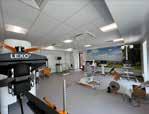
example of what can be achieved when innovation, care and strategy come together – with a brilliant collaborative approach from all project partners.”
The development was made possible through legacy funds from the late Fred and Ann Green and additional support from DBTH Charity, which enabled the purchase of the specialist equipment.
Professor Deb Lowe, Medical Director of the

Stroke Association, described the suite as a “gamechanger”, adding:
“Facilities like this give patients the chance not just to survive stroke, but to thrive and recover more fully.”
Zara Jones, Deputy Chief Executive at DBTH, said the suite reflects the Trust’s new Healthier Together strategy, “delivering exceptional care for all” and empowering patients to take control of their recovery.

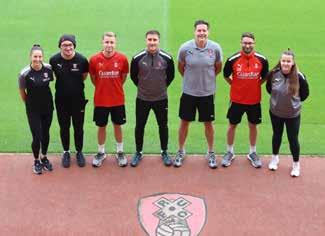
A team of dedicated Rotherham United supporters is taking on a gruelling 100mile walk to raise £10,000 for local causes – and they’ll be doing it all on foot, arriving just in time to cheer on their team away at Northampton Town.
Organised by Rotherham United Community Trust (RUCT), the four-day fundraising challenge is part of the club’s centenary celebrations. A group of 25 walkers will set off from the AESSEAL New York Stadium on 8 October, aiming to arrive at Sixfields Stadium in time for the League One clash between the two sides on 11 October.
Covering up to 29 miles per day, the group will pass through Mansfield, Loughborough and Market Harborough, totalling an estimated 250,000 steps each. Funds raised will support RUCT’s community outreach work across the borough, focused on improving physical and mental health.
Former Millers and Cobblers defender Ryan Cresswell will join the final leg, setting off at 5am on matchday. He made nearly 100 appearances across both clubs and is expected to
receive a warm welcome from both sets of fans.
The event has received widespread backing from local businesses, including headline sponsor Ford & Slater DAF, and support from Broadsword, Medequip, Press Box, and Ross Care. Kit has been supplied by sustainable clothing brand Reflo.
Jonathan Allan, Director of Development at RUCT, said: “This is one of the toughest physical challenges the trust has ever undertaken – but also one of the most rewarding.”
Donations can be made via the event’s JustGiving page (search ‘100 miles for 100 years’). The trust is also hoping to forge new partnerships with local businesses to support its work. Anyone interested should contact jonathan.
allan@ruct.co.uk.


More of us feel the urge to give back – to volunteer, to get involved, to step up – as the NHS and social services face enormous pressure and can no longer support vulnerable adults and children as they once did. The impact of poor physical and mental health, first laid bare during COVID-19 and reinforced for many hardworking families by the Cost of Living Crisis, is still being felt across our communities.
Today, we rely on the voluntary and charitable sectors to deliver services once provided by central and local government. Without them, it’s no exaggeration to say the country would face a deeper dilemma: more crime, more homelessness, and fewer youth services and support at the very moment more people need help simply to get by.
Social enterprises are increasingly stepping in where traditional models don’t reach. Community Interest Companies, Community Benefit Societies and Cooperatives can address local needs, drawing on grants from trusts and foundations alongside community and corporate fundraising. Done well, they help people lift themselves out of poverty and improve lives.
I enjoy the buzz of working with social entrepreneurs who are passionate about helping their neighbours but aren’t sure how to navigate the requirements. I run an online course and offer 1-2-1 support to help purpose-driven founders become fundable, compliant and sustainable – doing good, earning a living, and reinvesting impact rather than profit.
For more information relating to the business planning for your organisation, contact - Wendy Ward, Let’s Save Consultancy Services, 0772 9481010. wendy@letssave.biz



The grant will cover part of the project cost. The funding is allocated as
Get up to 50% funding forprojects costing up
For bigger projects, the maximum grant is
The minimum grant you canapply for is £1,500 (for a project where the total

GET EXPERT SUPPORT AND A GRANT TO SAVE ENERGY IN YOUR BUSINESS!
The Low Carbon Project has secured an extra £1.6million in funding from the UK Government Shared Prosperity Fund. This means more support isavailable for eligible businesses looking to cut energy costs and reduce carbon emissions,
• One-to-one support from an advisor
• Free energy survey
• Grant







As Christmas approaches, Weston Park Cancer Charity is inviting the South Yorkshire community to support its vital work by getting involved in a range of festive fundraising activities.
From hosting a Christmas jumper day to joining a concert under the stars, there are plenty of ways to make a difference – and every penny raised will go towards supporting cancer patients, their families and the staff at Weston Park Cancer Centre.
Shine Bright for the Christmas Star Appeal
The centrepiece of this year’s festive campaign is the Christmas Star Appeal, which encourages supporters to donate in honour of someone special or simply to give back during the season of goodwill. Every donor will receive the charity's 2025 decoration to hang with pride at home or in the workplace.
Money raised through the appeal helps fund everything from pioneering cancer research and patient support services to essential equipment and improvements to the hospital environment.
Sing Under the Stars
Community spirit and Christmas cheer will be in full swing at Sing Under the Stars – the charity’s annual festive concert at Victoria Hall on Thursday 11 December
With music, drinks and a warm, uplifting atmosphere, it’s the perfect way to celebrate the season while supporting a cause close to the region’s heart. Tickets are just £5 and available now at westonpark.org.uk/events.
Christmas Jumper or PJ Day
Schools, colleges, nurseries and businesses across South Yorkshire are also being encouraged to don their best festive jumpers or cosiest pyjamas for a Christmas dressdown day
Simply pick a date in December, register with the fundraising team, and let the celebrations – and donations – roll in. The Weston Park team is on hand to offer guidance, promotional materials and fundraising tips. Just email charityteam@ wpcancercharity.org.uk to get started.
Another simple but impactful way to contribute is by buying from the charity’s online Christmas shop. Featuring a selection of beautifully designed cards, the shop also offers the option to make a direct donation to key services supported by the charity.

Make This Christmas Count
Whether you’re singing songs, dressing up for a cause or making a personal donation, your support this Christmas will help Weston Park Cancer Charity continue its lifechanging work.

To find out more and get involved, visit the dedicated Christmas campaign page at westonpark.org.uk/christmas – or scan the QR code to start making a difference today.
As AI hype continues to dominate the business agenda, Sheffield-based technology company Simoda is cutting through the noise with a people-first, outcomes-driven approach...
If there’s one message we’ve all heard too often lately, it’s “transform your business with AI for success” or “AI adoption is accelerating – don’t get left behind.” But what does that really mean if we’re not focusing on what truly matters?
Real success doesn’t come from chasing buzzwords or quick wins. It comes from putting in the graft, solving complex business challenges, and delivering tangible outcomes that drive sustainable growth, operational efficiency and long-term resilience.
Sometimes, the right answer is AI – but the questions remain the same: what problems are you trying to solve, who are the best people, what are the best processes and technologies to do it, and what outcomes are you aiming to achieve? It’s this straightforward, customer-first mindset that defines Simoda’s approach. The Sheffieldbased business technology partner has built its success on authenticity, transparency and years of experience helping organisations make the right strategic choices.
That approach has fuelled impressive growth since Simoda was founded in 2019. “We have battled through a global pandemic, a cost of living crisis, the rise of cyber security and now we are into the AI age,” says Managing Director Daniel Bumby. “Building on our fantastic foundations and the changing needs of the technology marketplace and businesses, we have taken the decision to implement leadership and business changes.”
As part of this evolution, Kate Hill
has been appointed Commercial Director, overseeing marketing strategy and the company’s growing network of strategic partnerships, including work across the public sector. Christian Colton takes on the role of Network Services Director – an area that has experienced significant growth – while Simon Flint, who joined as Head of Finance last November, steps up to become Finance Director.
Simoda’s expanding service portfolio now enables the team to support clients ranging from small businesses to large enterprises. Its technology solutions cover IT procurement, cloud, communications, cyber security and AI infrastructure, helping customers develop their own AI capabilities while keeping investment in the region. Technology services include managed IT support, technical project delivery and a fast-growing network services division, providing fibre work, cabling upgrades, Wi-Fi and advanced security systems.
“I wanted to take a moment to highlight something that I believe has been instrumental in the growth of our network services business,” says Christian. “Our success is largely attributable to our approach of engaging with our customers to understand their pains and issues thoroughly. By having open and honest conversations, we can identify the challenges they face and work collaboratively to find practical, financially viable solutions. This methodology helps us deliver the best possible impact for our customers.”
Partnerships play a key role
in Simoda’s philosophy. “The technology marketplace is too big for one business to hold all the answers,” says Kate. “We’ve built a fantastic ecosystem of partners to support the delivery of first-class services – from finance and software development to creative, marketing, compliance and leadership support. We take a ‘local first’ approach because we believe in regional success. If a customer needs something beyond our core offer, we’ll find a way to help them achieve it through our extended partner network.”
Simoda’s partnerships extend beyond the boardroom too. The company has teamed up with F4 racing driver Rowan CampbellPilling, supporting his team with technology and IT solutions while welcoming customers to race weekends. The collaboration is set to grow next year, with new projects planned to drive performance and innovation.
With growing demand from existing clients, Simoda has also expanded into Europe – a milestone that arrived earlier than expected. “We always planned to operate internationally,” says Daniel. “It’s come around quicker than we imagined, but we’re thrilled to have the operational and delivery capability to meet our customers’ needs.”
Reflecting the company’s continued evolution, Simoda has invested in a new, more responsive website developed in partnership with Sheffield’s Reach Studios. The site will better support customer engagement and make it easier for businesses to access services and resources.
“As a company, we’ve grown our revenues year on year, and I expect that to continue as we mature,” Daniel adds. “We’re passionate about supporting our local economy and helping businesses get the most out of any technology investment. I also expect to see further development of our partner ecosystem, and I’d encourage any business leader interested in exploring a partnership to reach out for a chat.”
To learn more or speak to the Simoda team about your IT or technology needs, email marketing@simoda.co.uk, visit simoda.co.uk, or follow Simoda on social media.
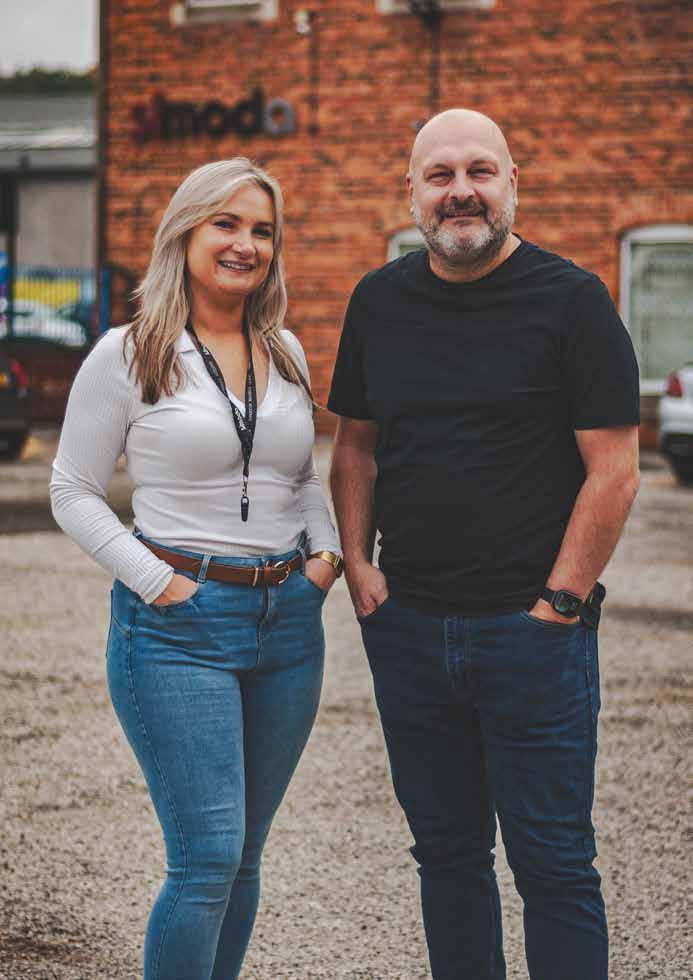



Following the merger, our enhanced range of business legal services now include:
Agricul tural Law
Regulator y Law
Dat a Protec tion
Intellec tual Proper ty Employee Ownership Trus ts Renewable Energ y



Scan here to see our full range of commercial services.
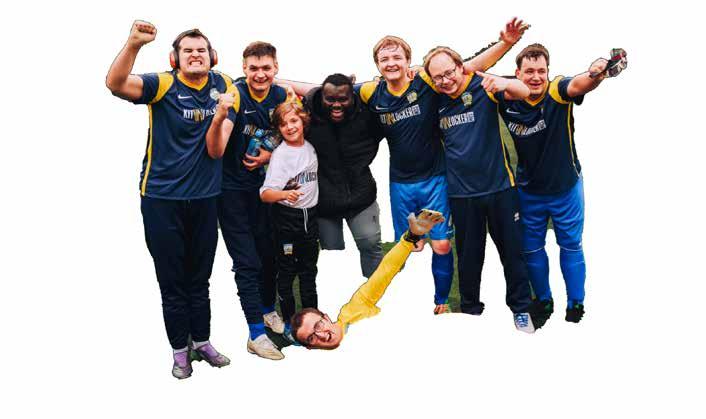


Businesses across South Yorkshire are showing renewed stability and cautious optimism, according to the latest Quarterly Economic Survey – but as confidence in artificial intelligence grows, a gap is emerging between ambition and preparedness.
Conducted by Doncaster Chamber, Barnsley & Rotherham Chamber, and Sheffield Chamber in partnership with the British Chambers of Commerce, the Q3 survey is a trusted barometer of business sentiment locally and nationally. With input from 290 South Yorkshire businesses between August and mid-September, it sheds light on how firms are adapting to both economic conditions and the fastmoving AI landscape.
Encouragingly, the results show a steadying economy. More businesses reported stable UK sales and orders compared to the previous quarter, and cashflow turned positive for the first time in nine months. Export demand, while not yet fully recovered, is also trending upward.
However, the region’s business community remains cautious. Permanent recruitment is still subdued – at its second-lowest level in more than four years –though there are early signs of improvement, particularly for temporary roles. Skills shortages eased slightly, especially in clerical sectors, though technical and manual roles remain difficult to fill.
Amid this stabilisation, the headline finding of the survey

was the region’s appetite for AI. An overwhelming 86% of businesses said they intend to increase AI adoption, with marketing, operations and customer service departments currently leading the charge. But when asked how prepared they were to make meaningful use of AI, the responses revealed a more complex picture.
Only 14% of businesses reported being “very prepared” with a clear AI strategy in place. Over half (55%) said they were “somewhat prepared”, while nearly a third (31%) openly admitted they had AI ambitions but were “not yet well prepared”.
Dan Fell, Chief Executive of Doncaster Chamber, described this as both a
risk and an opportunity: “Businesses in our region clearly see the potential of AI, but too many are trying to run before they can walk. One in three have ambitions to integrate AI but don’t yet have the skills, policies or leadership structures in place.”
The survey also found that just 21% of firms have a formal AI policy, with another 20% currently developing one. Collaboration on AI remains limited, with over half of businesses working independently and less than a third engaging with external partners – typically technology firms or consultants.
Carrie Sudbury, Chief Executive of Barnsley & Rotherham Chamber, added
that major barriers include a lack of knowledge, inhouse skills, and uncertainty around AI ethics: “These are all challenges that could be addressed through collaboration and targeted support.”
With SYMCA’s Growth Strategy now in place and confidence beginning to return, the foundations are there for South Yorkshire to lead on responsible AI adoption. But as Sheffield Chamber’s Louisa HarrisonWalker warned, ambition alone is not enough – trust, training and infrastructure must follow.
So, a question to ponder: what will it take to turn South Yorkshire’s AI ambition into action – and ensure no business is left behind?



